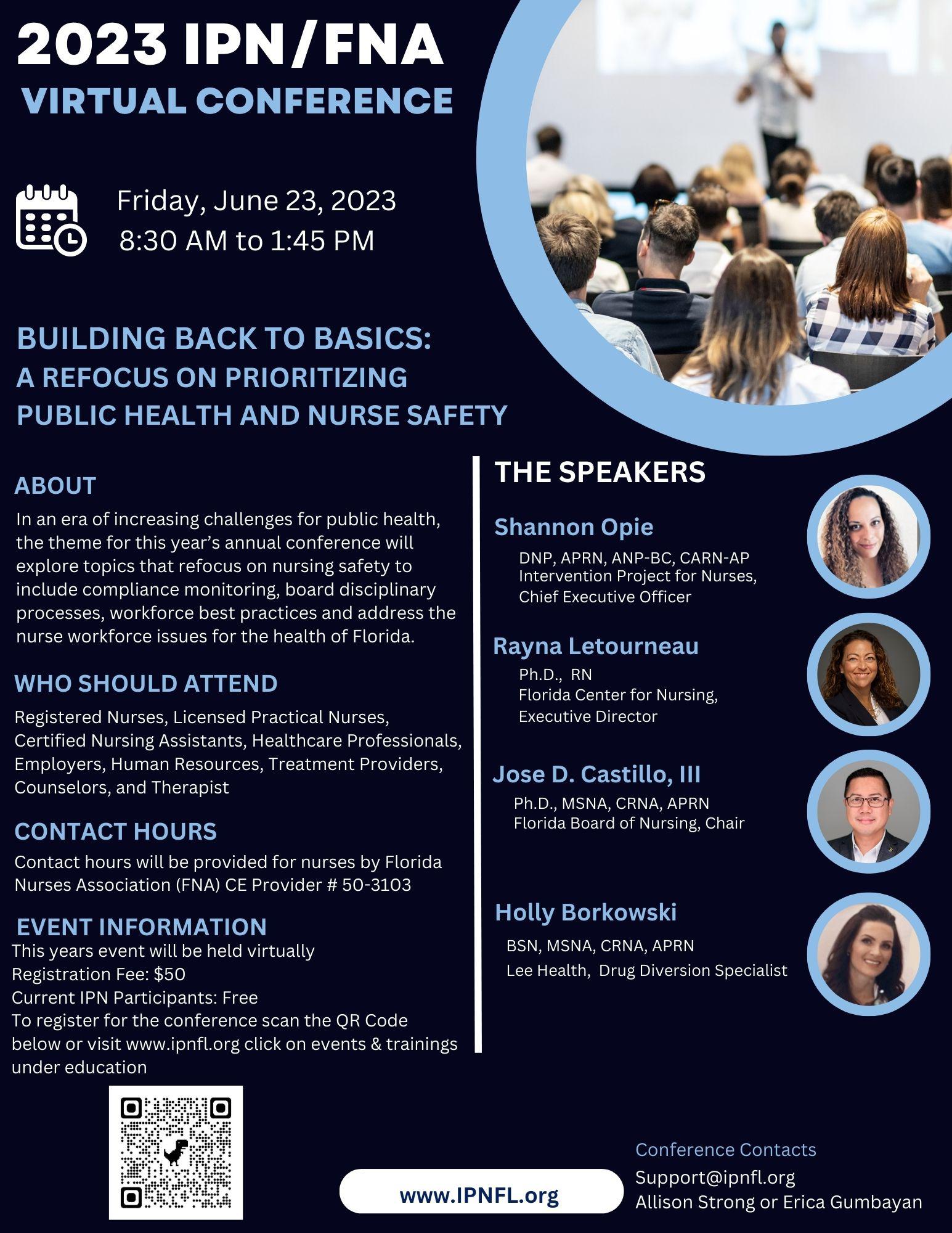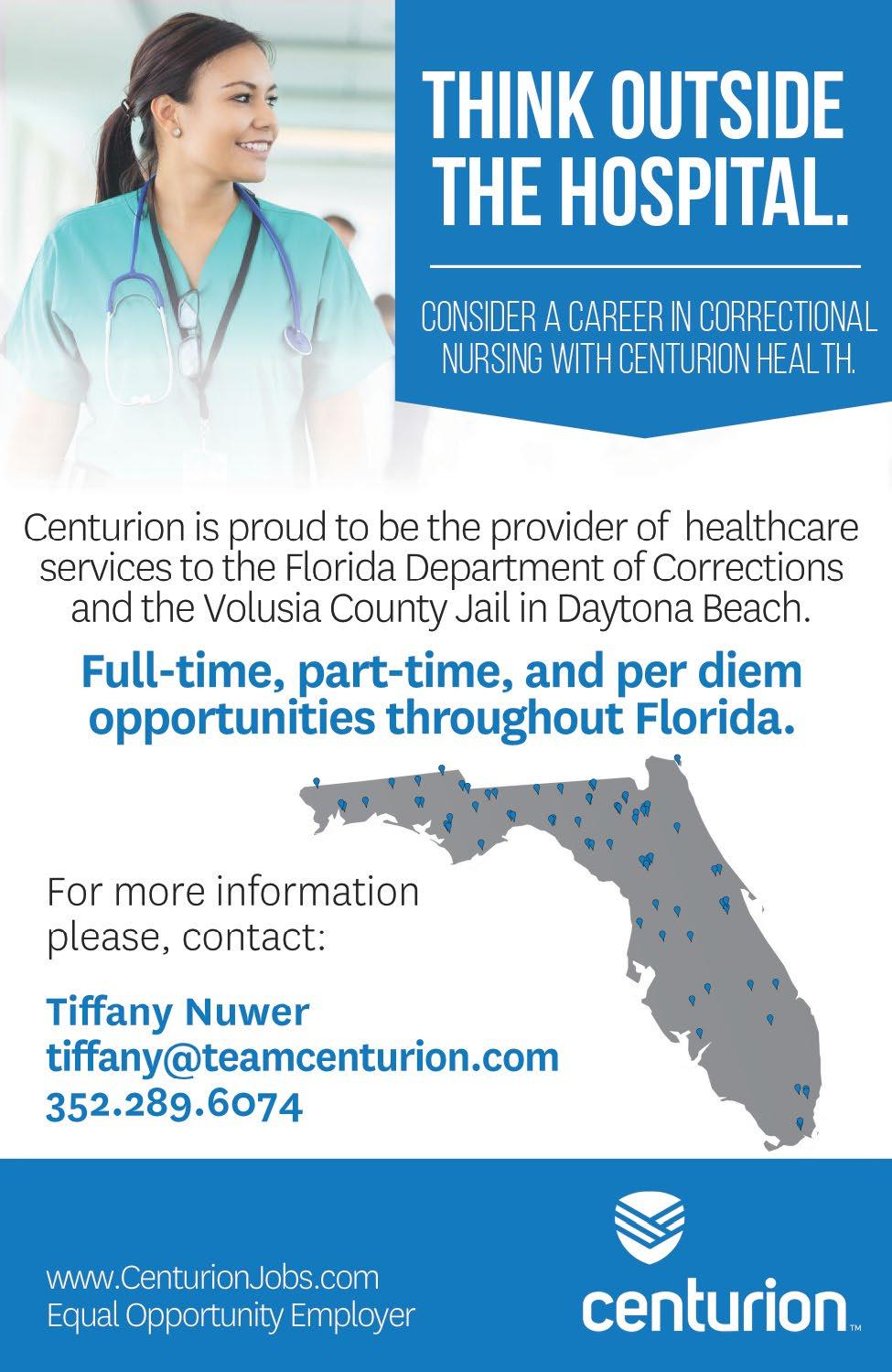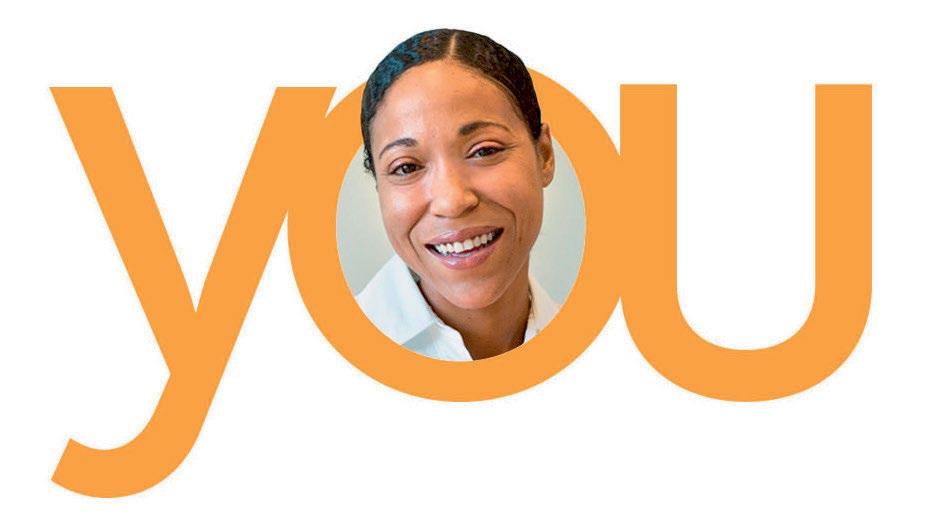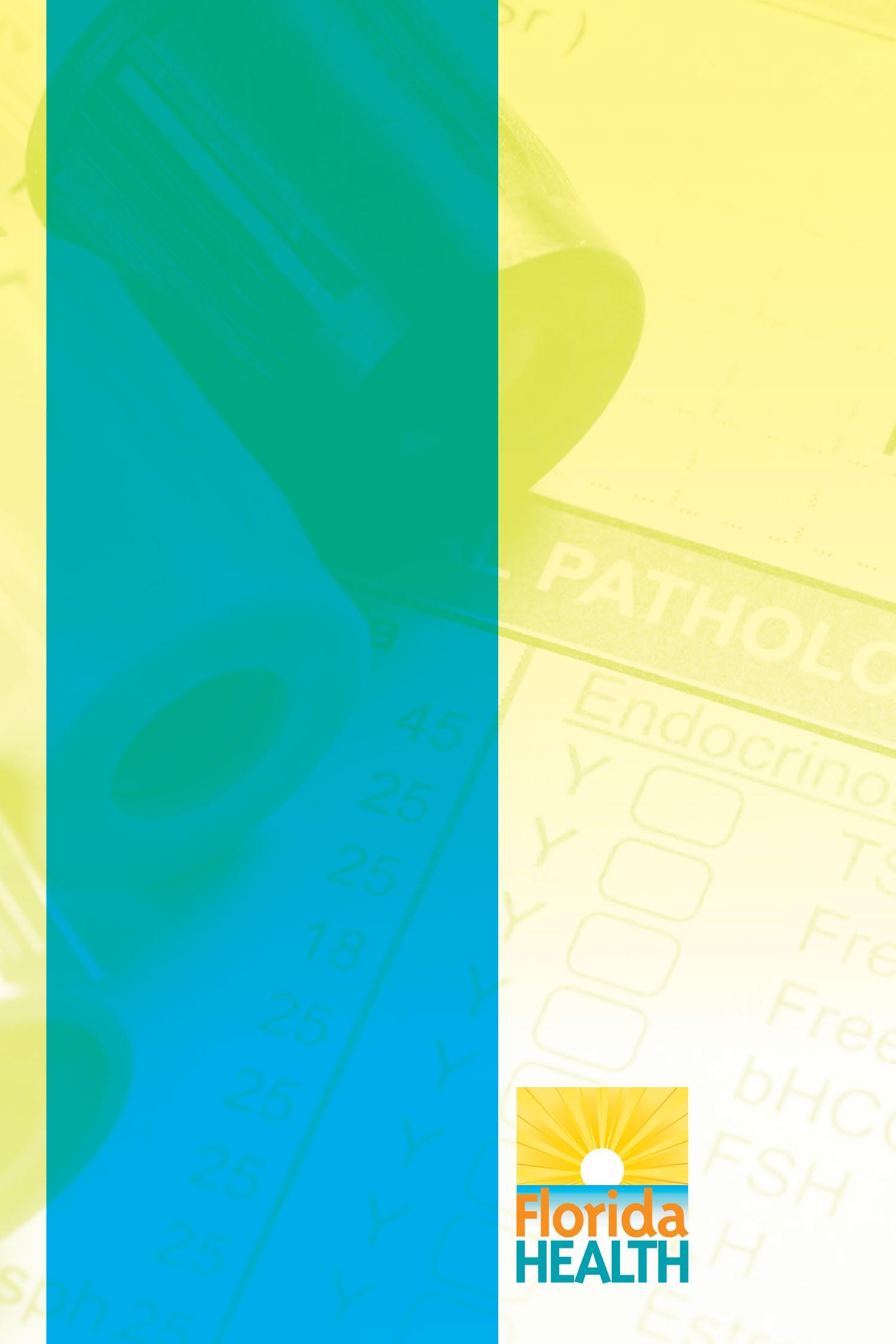










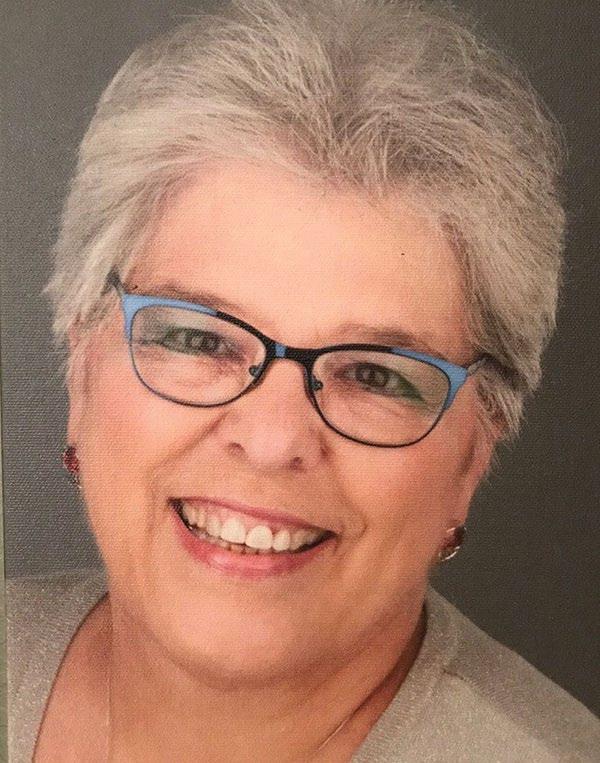


Happy New Year! I am hearing that many of us are happy to see 2022 come to an end. We look forward to a great new start or reset. As we did in 2021 and 2022. We are still facing some uncertainty in nursing. This is an important year to focus on nursing. We have received significant funding in the state to do great things for our profession. On January 5, 2023, the Governor’s Office announced another $79 M for high-performing nursing education programs in Florida. The funding rewards public postsecondary nursing programs that have gone above and beyond to train Floridians and provides matching funds for scholarship awards, faculty recruitment, equipment, and additional educational supports. This funding is through the Linking Industry to Nursing Education (LINE) and Prepping Institutions, Programs, Employers, and Learners through Incentives for Nursing Education (PIPELINE) programs, which are designed to mitigate Florida’s nursing shortage. This is in addition to the $5 billion to workforce education funding, supporting Floridians who aim to start new careers and rewarding institutions that provide highquality training and education programs.
The theme established in 2021 for my term as FNA President was to Regain, Retain and Reconnect. I see this year as time to focus again on retaining nurses in our profession. Many nurses left nursing during and following the pandemic. We need to join forces to retain nurses in the nursing profession. Far too many nurses are leaving the profession for several reasons. Fear, pay, stress and burnout are just a few. The continuing workplace demands have caused burnout, anxiety, and departure of nurses from the nursing workforce. There has been an increase in workplace violence against nurses. As reported by Androus (2021), “Nurses leaving
the profession within the first 5 years of their career is a significant symptom of the larger challenges in nursing. With alarming rates of up to 33% of new nurses leaving the workforce within the first two years, the (not so) great escape must be addressed overall by the profession.”
FNA is working to address workplace violence through legislation. Our 2023 Legislative platform includes this position statement:
The FNA supports safe practice environments for all nurses and our patients.
• The FNA supports legislation that provides meaningful information to users of health care about staffing and nursing resources in health care facilities.
• Promote legislation that protects healthcare workers against workplace violence, including efforts to rigorously prosecute those who commit such crimes.
At the February 2023 Advocacy Days we will be discussing this with our legislators to make them aware of the situation and advocate for legislation to support a change.
FNA continues to support the work of the Florida Center for Nursing (FCN) led by Dr. Rayna Letourneau, Executive Director. FCN/QUIN/NACFL are sponsoring a Nursing Think Tank workshop on February 7, 2023, in Tallahassee just prior to FNA Advocacy Days. The FCN workshop will present the statewide education survey findings from academic years 2020-2021 and 20212022 (including NCLEX results) and allow for feedback and strategic planning regarding nursing education and workforce in Florida.
Our strategic plan has six pillars… Nurse Advocacy, Member Services, Nurse Development & Support, Public & Professional Awareness, Professional Unity, and Organizational Excellence. Our mission is to advance the profession of nursing and promote a healthy Florida. For 2023, we will continue our focus on rebuilding the profession. FNA is engaging other nursing organizations in Florida to gather strength for our voice.
Owned and Published by, Florida Nurses Association
 Willa Fuller
Willa Fuller
Before COVID-19, there was always activity related to the NURSING SHORTAGE. I have been a nurse for over 30 years, and even as a student, this was a frequent topic of discussion, focus of journal articles and research studies. Yet here we are, embedded in even more activity around the shortage after the devastating impact of the COVID-19 pandemic. The issues are both straight-forward and complex but the result is the same - there are not enough nurses to care for patients all over the world.
So, what are some of the simple reasons?
1. The work is physically, mentally and emotionally demanding.
2. Nurses feel unappreciated and undervalued.
3. Nurses are subject to constant, impossible demands every day that they work. They have expectations from patients, families, physicians, other healthcare professionals, and their leaders and administrators.
4. Complex bureaucracies impact their everyday work taking them away from patient interaction and the human caring connection which is key to job satisfaction for nurses.
5. When nurses “fall short” of these unsurmountable expectations, they are often met with punitive measures or “corrective actions.” Here at headquarters we sometimes encounter this with nurses who have a spotless record and many years of service. Suddenly, they are being written up and disciplined and sometimes terminated if the error is considered egregious enough.
Areas of complexity include the external forces that impact nursing and healthcare, one of the most significant being legislative action that is clothed in “helping.” What are some of these actions?
By now, most of you have heard of the recent events where there were over 7,000 fraudulent diplomas and transcripts sold to individuals who sought to become nurses. These were all connected to three “schools” in Florida where in 2009, the authority to regulate nursing schools was stripped by legislative action. Many expert nurse leaders testified before the House and the Senate with very reasonable rationale regarding the harm this could cause. Instead, the rationale was advanced that this could help solve the nursing shortage and there was even some belief expressed that the Board of Nursing went outside of their scope and that they were too “heavy-handed” in their oversight of nursing schools.
Fairly quickly, nursing schools began to open up and as time marched on, they began producing more nursing graduates, many of whom were not able to pass the NCLEX exams. There were some schools that took students’ money but then would not allow them to take NCLEX for fear they would fail and bring their pass rates down. Some students called us reporting that they had no instructors or that their instructors were not qualified to teach. One student who had paid $15,000 (her life savings) said her “school” only had one broken manikin to practice skills. There were many other stories.
Over the past few years some laws and regulations have been put in place to ameliorate some of the chaos that ensued after that legislative change. The Board has regained some oversight but there are now over 300 schools to oversee with a small staff.
And I might as well go all in… with a critical shortage of qualified faculty, who is teaching all of these nursing students and what are they learning?
When I think back to the seriousness of my educational experience and the repeated lessons regarding core principles of nursing practice I wonder what some of these students have learned?
Ethics, accuracy and safety, professionalism and comportment (how we carry ourselves as nurses) were central to my takeaways in nursing school. It was more than about taking the test. And most important to delivering safe care was critical thinking. In a nutshell, “this just happened, what do I do next?” All of these concepts are modeled, taught and tested through every course in nursing and through observation, story-telling and experiential learning.
As a preceptor to many students over the years I remember having a group of students from my own school who made a significant error by giving multiples medications to the patient in the wrong bed. When the instructor when to check on the patient, he told her that he didn’t get any meds but the patient in the other bed spoke up that he got some meds he had never taken before. The teacher made the horrified student call both doctors and let them know. Fortunately, this doctor was kind but the lesson was clear and the instructor had the student complete the incident report and gave a lesson about that in post-conference.
So, what is the new and the old, that I am speaking of?
There have been many changes in the workplace today. The electronic health record has changed the way nurses document and that is a permanent part of the healthcare landscape.
Technology is ever growing and changing and nurses have to be agile and flexible to stay abreast of the latest technology. They are also asserting themselves in the development of technology so that it best serves their practice and the patients. This must become a commonplace occurrence.
Care is continuing to move more into the community so nurses must be educated in a way that makes them competent to practice in a variety of settings.
Nurses must be at the forefront of decision making as it relates to any environment where nursing care takes place. Policy makers should not be determining crucial nursing education or practice issues such as who nurses can delegate to. More people to supervise or delegate to does not help nurses or patients.
We must continue to reiterate the importance of REGISTERED NURSES as the direct care givers who cannot be replaced by less educated and less qualified ancillary personnel performing tasks they are not prepared to execute safely.
Licensed practical nurses are a valued and viable support to nurses to add safety to the workplace as a partner in care to registered nurses.
High standards as outlined in the Code for Nurses should be utilized as a standard for care delivery and quality of care. Neither a shortage or a pandemic or any other disaster should be used as an excuse for shoddy care. We cannot just throw our hands up and let the chips fall where they may.
The quality of the work environment is key to putting the profession on the right path. Bedside nursing is an honorable profession that needs immediate and critical attention. Happy employees do not leave great jobs. Current and future patients need experienced, qualified nurses who stay at the bedside long enough to become experts and mentors to novices and new graduates.
In order to tame this unwieldy beast, we must stop throwing band-aids at a rampaging elephant. None of them are going to stick. We also need to stop blaming individuals as this decade long problem is more massive than all of us. We need innovative models of care, a sufficient number of nurses, adequate orientation and support, appropriate resources, and satisfactory rewards commensurate with service given.

1235 E. Concord Street, Orlando, FL 32803-5403
P.O. Box 536985, Orlando, FL 32853-6985
Telephone: (407) 487-2330
FAX: (407) 896-9042
E-mail: info@floridanurse.org
Website: http://www.floridanurse.org
Office Hours: 8:30 a.m. to 4:30 p.m., Monday thru Friday
For advertising rates and information, please contact Health eCareers, HEC_Nursing_Info@ healthecareers.com. FNA and the Health eCareers reserve the right to reject any advertisement. Responsibility for errors in advertising is limited to corrections in the next issue or refund of price of advertisement.
Acceptance of advertising does not imply endorsement or approval by the Florida Nurses Association of products advertised, the advertisers, or the claims made. Rejection of an advertisement does not imply a product offered for advertising is without merit, or that the manufacturer lacks integrity, or that this association disapproves of the product or its use. FNA and Health eCareers shall not be held liable for any consequences resulting from purchase or use of an advertiser’s product. Articles appearing in this publication express the opinions of the authors; they do not necessarily reflect views of the staff, board, or membership of FNA or those of the national or local associations.
Published quarterly, February, May, August and November by FNA, a constituent member of the American Nurses Association.
Editor – Kaitlin Scarbary, 1235 E. Concord St., Orlando, FL 32803-5403
Subscription available at $20.00 plus tax, per year. Members of FNA receive the newspaper as a benefit of membership.
COPIES of The Florida Nurse are available on 35mm microfilm, 106mm microfilm, article reprints and issue copies through Bell & Howell, 300 North Zeeb Road, Ann Arbor, Michigan 48106
Board of Directors
2021–2023
Officers
Janice Adams, DNP, MPA, BSN, President
Marie Etienne, DNP, APRN, FNP, PNP, PLNC, President-Elect
Debbie Hogan, RN, BSN, MPH, Vice President
Valerie Halstead, PhD, APRN, FNP-BC, Secretary Mavra Kear, PHD, APRN, BC, Treasurer
Region Directors
Jake Bush, MSN, RN, Northwest Region
Kellyann Curnayn, DNP, APRN-BC, North Central Region
Susie Norman, MSN, Northeast Region
Marcos Gayol, EdD, MSN, MPH, RN, East Central Region
Meghan Moroney, BSN, RN, West Central Region
Cynthia Tagliaferri, RN, BSN, DNP Student, Southeast Region
Vacant, Southwest Region
Linda Washington-Brown, PHD, EJD, MSN, APRN-C, FAANP, FAAN, South Region
Director of Recent Graduates Vacant
LERC Liaison
Marsha Martin, RN
FNA Office
Willa Fuller, BSN, RN, Executive Director
John Berry, Jr., Director of Labor Relations & Government Affairs
Kaitlin Scarbary, Director of Member Programs, Technology, and Marketing
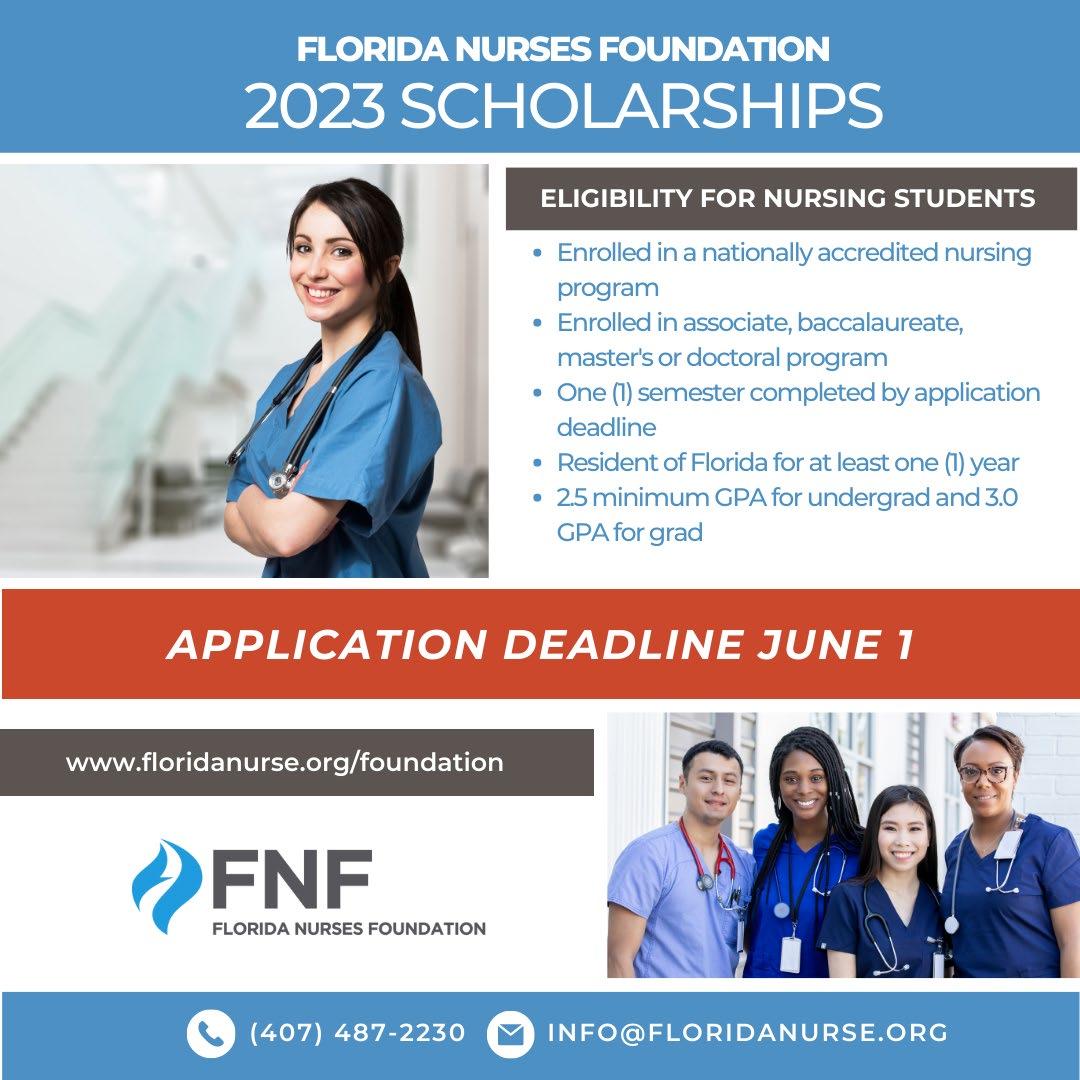
It’s time to spread the word about the Foundation Scholarships and Grants! The Foundation has over 30 scholarships available for nursing students residing in Florida and currently enrolled in a nationally accredited nursing program. Applicants must have completed at least one semester in their nursing program to qualify. The application window is open from January 1 to June 1. There are many scholarships and grants available but each year we have awards that are not given because there are no applicants who meet the guidelines. Some of the funds have specific application requirements such as geographic location or nursing specialty. The Foundation offers scholarships for all levels of study including basic nursing programs, master’s level, and doctoral programs.
Applications are available on our website and must be completed according to specifications to be considered. Applicants submit one generic application and upon review are paired with the scholarship that best fits their profile. Descriptions of available funds are listed on our website to give applicants a sense of some of the scholarships they could be paired with. It is important to submit a complete and thorough application to provide reviewers with the best information about the applicant. Some examples of funds offered are listed below. Please review the full guidelines at www.floridanurse.org/ScholarshipsGrants
After Hurricane Ian left a path of devastation across Florida, the Florida Nurses Foundation received an unprecedented number of requests for assistance from nurses who had been impacted by the storm. The Foundation has a Hurricane Relief fund through its Nurses in Need program that can assist nurses with small grants to help them get through difficult situations. At the time we received these requests, our fund was depleted and we did not have enough available funds to meet the needs of those seeking assistance. We sent out a plea to FNA members to help us rebuild our fund to provide assistance for these nurses who had lost so much in the storm. FNA members and others in the community answered the call! Thanks to their generous donations, we were ultimately able to assist 21 nurses in their time of need. The grants they received will help them on their path to recovery after experiencing devastating losses from the storm. We are so grateful to everyone who was able to donate.
While we’re grateful for being able to assist those group of 21 nurses, there were still many that we were not able to provide funding to. We ask that you consider donating to the Foundation to help keep the coffers full for future times of need. To donate to the Nurses in Need Fund, visit www.floridanurse. org/NursesInNeed . You can also donate to our scholarship and grant program that awards 30+ scholarships and grants annually to nursing students and researchers at www. floridanurse.org/GiveBack
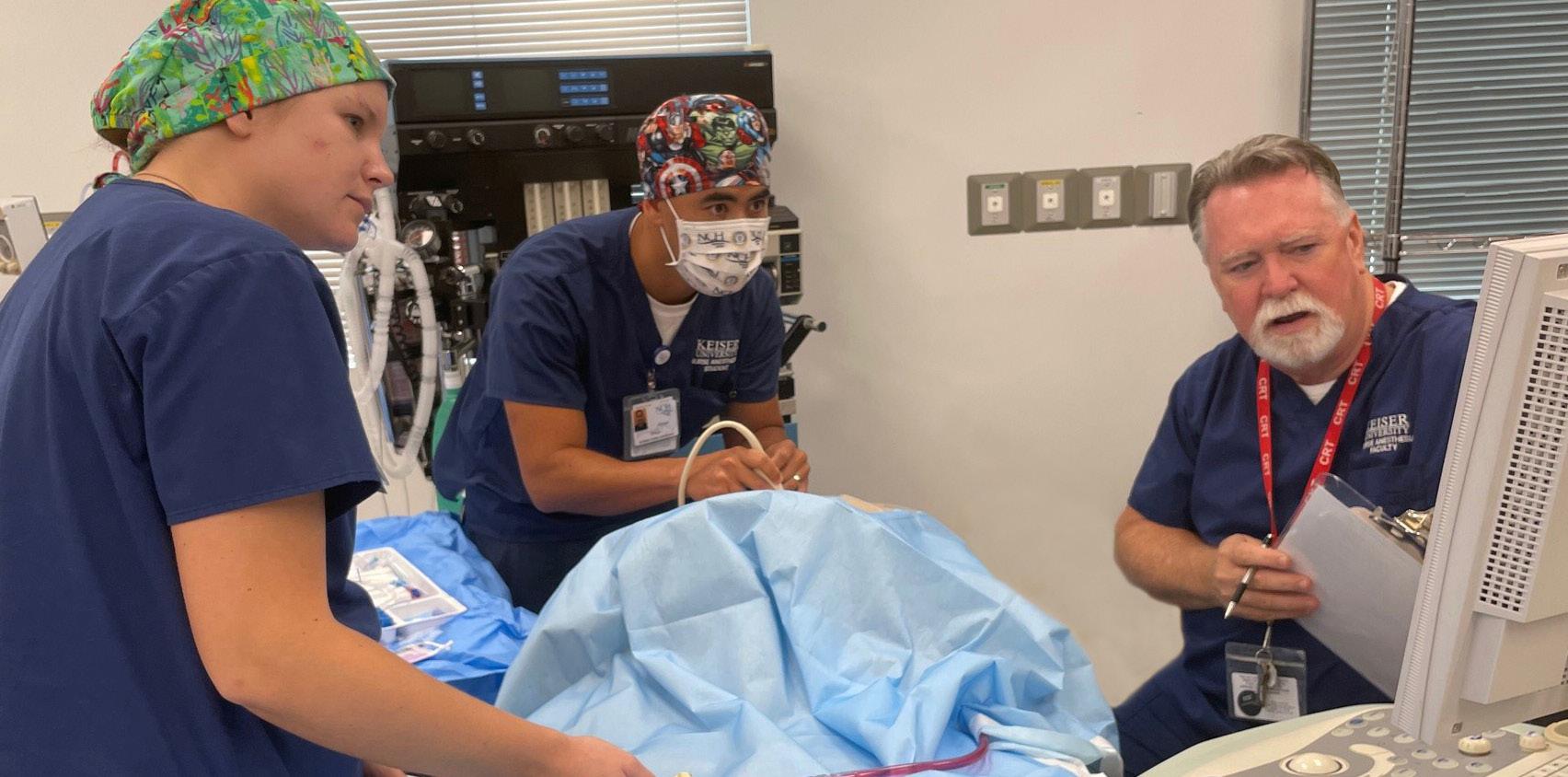

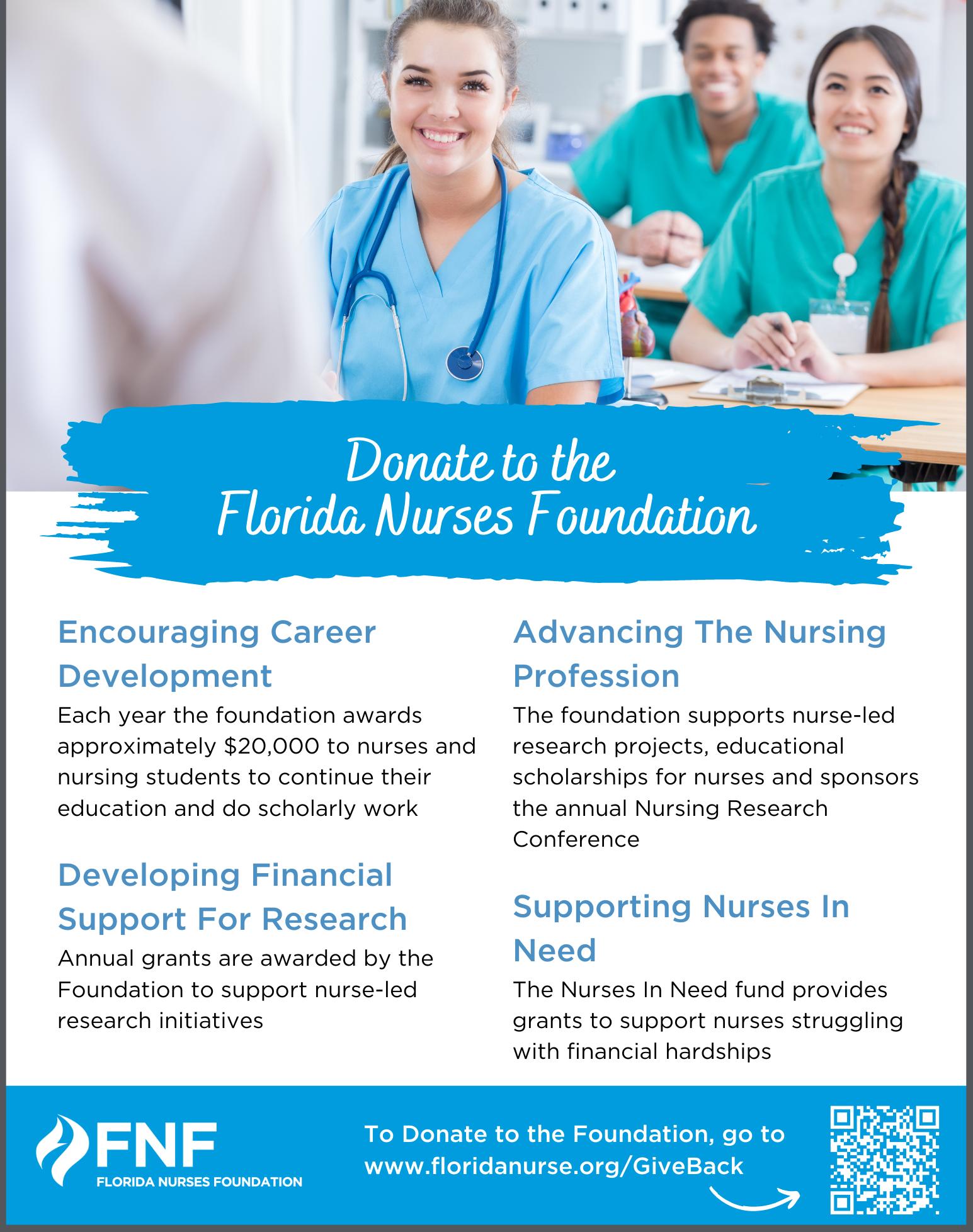
President’s Message continued from page 1
As we begin our New Year, please know that our members are the reason we forge forward offering opportunities, advocating for nursing in Florida, looking for ways to relieve the stress and continue to up the volume of our voice. FNA has many ways for our members to get involved. Go to https://www.floridanurse.org and join a committee or task force! We need your involvement to make our voice even louder.
Androus, A., (2021). The (not so) great escape: Why new nurses are leaving the profession. Registered Nursing.Org. Retrieved from https://www.registerednursing.org/articles/why-new-nursesleaving-profession/
The Florida Nurses Foundation has several opportunities for Nurse Researchers to receive grants. The purpose of the Florida Nurses Foundation (FNF) Research Grant Program is to encourage the research career development of nurses to advance the profession of nursing.
The principal investigator must be a registered nurse and be licensed to practice nursing in Florida. Applications for the research grant must be for a study (proposed or underway) that has not been completed prior to application deadline. Applications for Research Grants are due JUNE 1. Find the full guidelines and application at www.floridanurse.org/ScholarshipsGrants
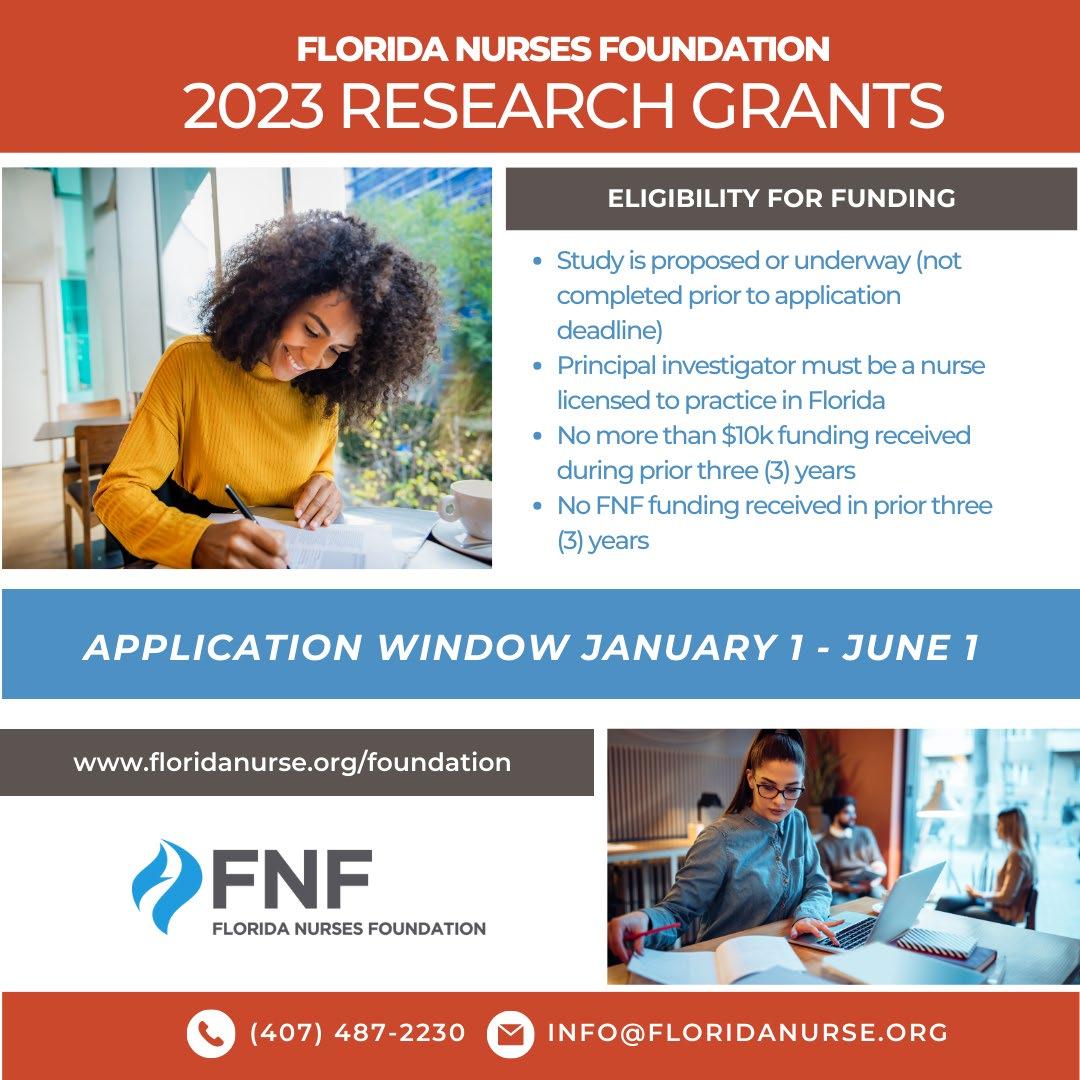

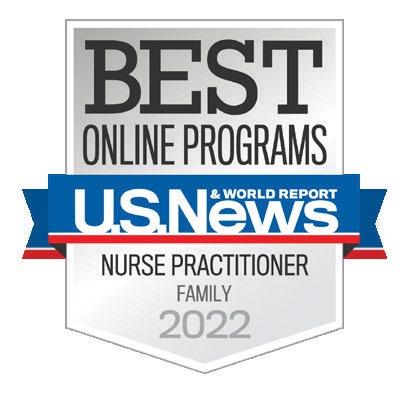


Some meetings such as committee meetings and recurring regional meetings are not included in the list below. View the Full FNA Calendar at www.floridanurse.org/events
2023 FNA Advocacy Days
February 8-9, 2023 | Tallahassee, FL
LGBTQ+ Health Conference
March 10, 2023 | Nova Southeastern University, Clearwater, FL
13th Annual South Region FNA Symposium and Awards Ceremony
April 22, 2023 | Gulfstream Resort, Hallandale Beach, FL
9th Annual FNA Research and Evidence-Based Practice Conference
July 29, 2023 | Harry P. Leu Gardens, Orlando, FL
Health Policy Special Interest Group
Every Second Tuesday | 7:00-8:00pm EST | Zoom Meeting
Ethics Special Interest Group
Every Third Tuesday | 6:00-7:00pm EST | Zoom Meeting
Holistic Nursing Special Interest Group
Every Third Thursday | 5:00-6:00pm EST | Zoom Meeting
Interested in presenting for FNA?
Go to www.floridanurse.org/speak
Members of FNA/ANA will be given priority.
We welcome all nursing students and Registered Nurses regardless of membership status to all of our events unless otherwise noted. For registration and more information about FNA events, go to www.floridanurse.org/events
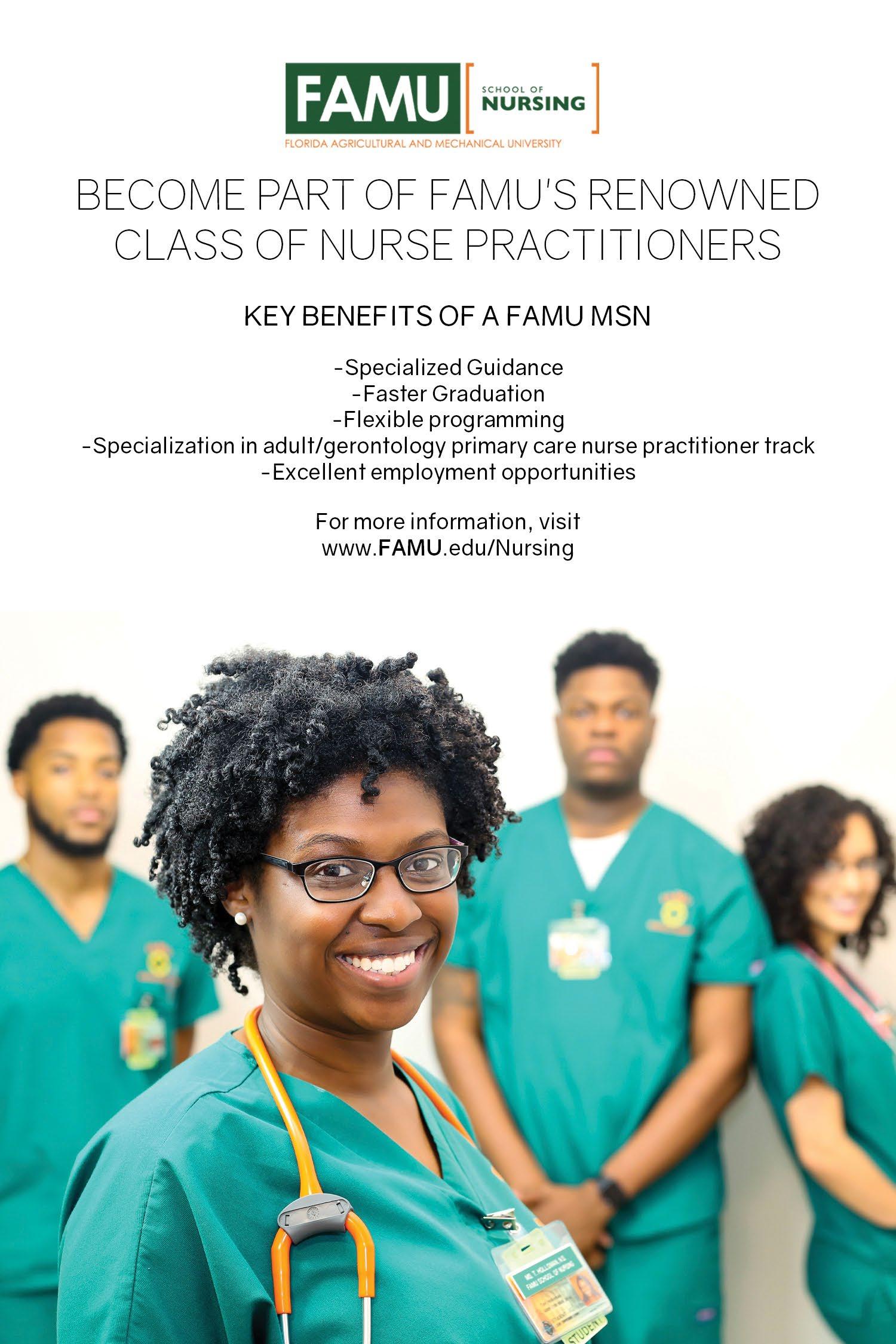
The Florida Nurses Association recently added a new staff member to its ranks! Alfaz Habiban joined FNA is December 2022 as the Program and Events Coordinator. He will be working closely with our team on meetings, events, marketing, membership services and more. In his previous position as an operations manager for a golf resort, he was in charge of membership, tournaments/ events and marketing. Over eight years, he was able to grow membership and helped run many successful tournaments, banquets and assemblies. After learning a lot about marketing throughout the years and developing his skills, he has brought his extensive knowledge to the role. Working with FNA, he hopes to meet new people, help nurses grow in their profession and learn more about the industry as a whole. In his free time, Alfaz likes to try new foods and hang out with friends. He has a growing list of places he’d like to travel to and is excited to be a part of Florida Nurses Association.
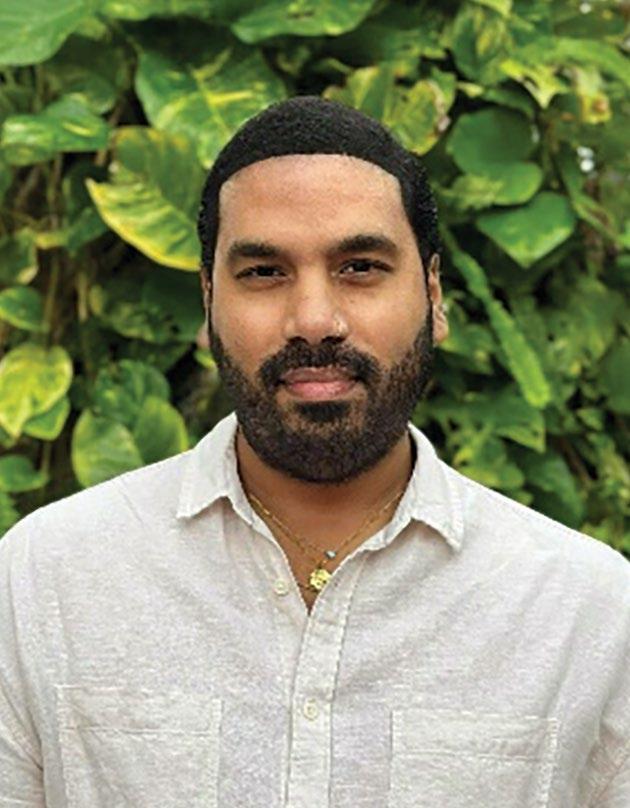




At NSU, you'll learn how to deliver patient-centered care from experienced practitioners who bring case studies to life. NSU prepares you to become a confident, capable, and caring nursing professional.

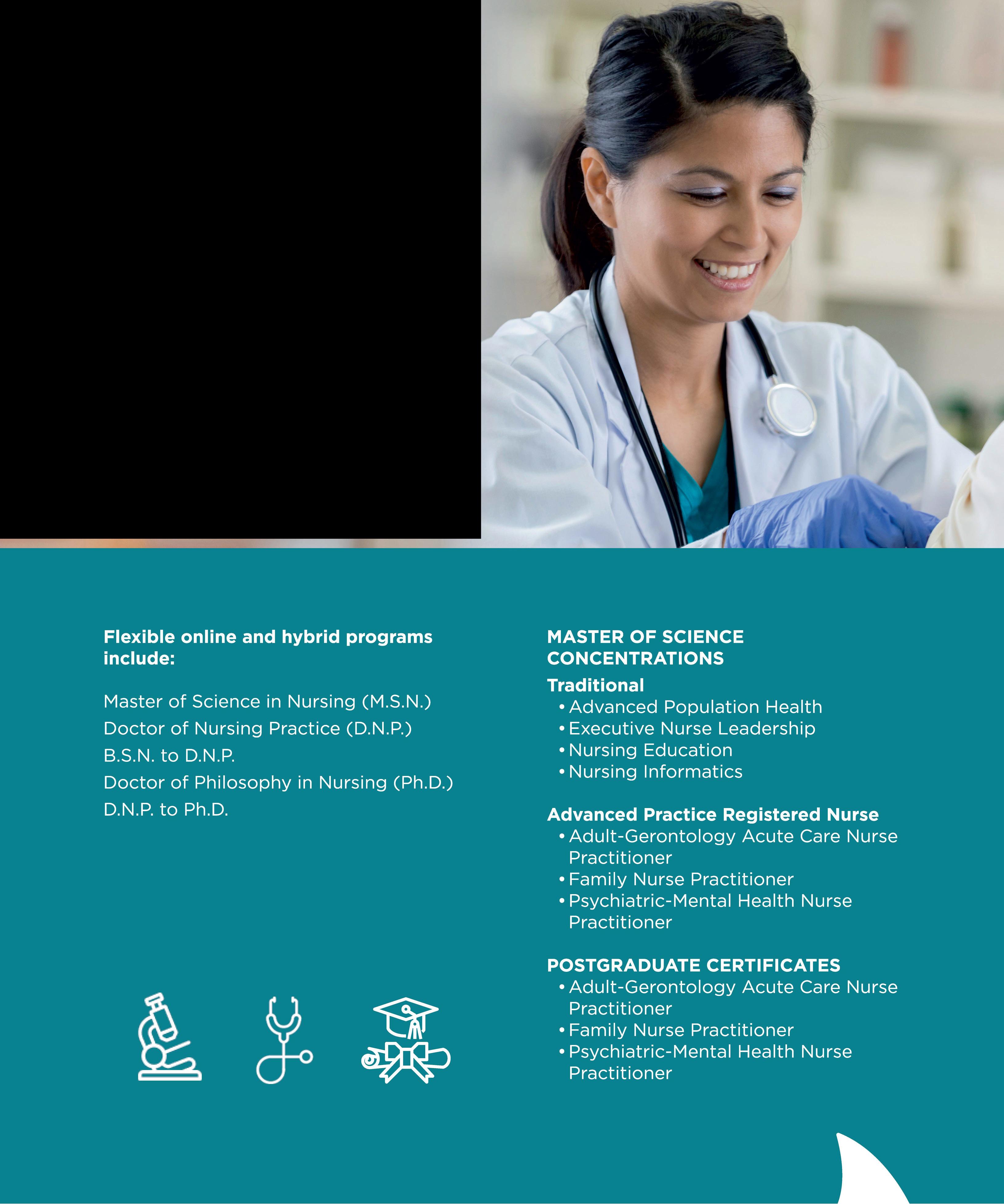
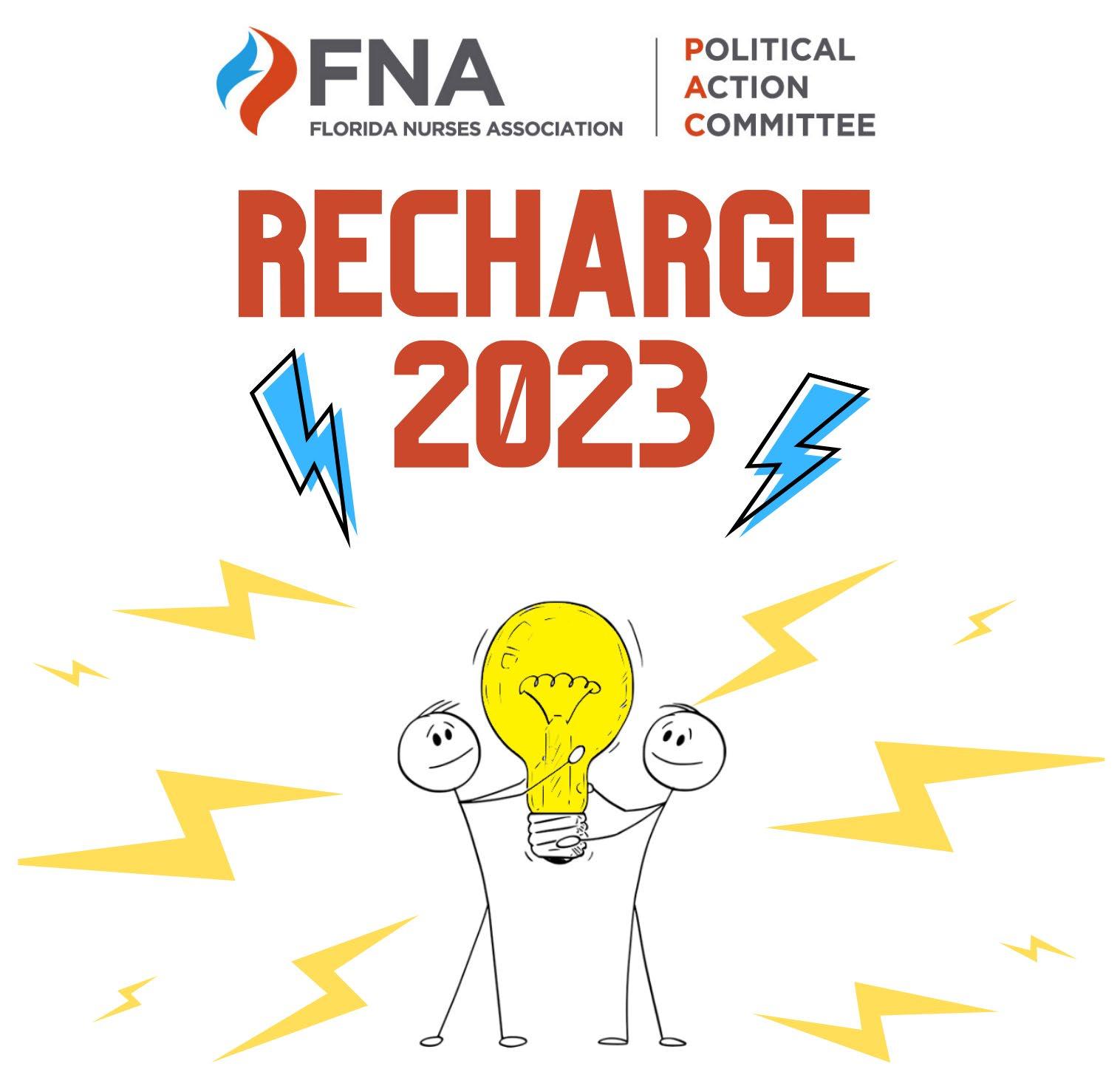

The Florida Nurses’ Political Action Committee (FN-PAC) exists to raise funds to support candidates that will work with us on issues related to nursing, patients and healthcare. A PAC is a powerful tool in making nurses voice heard. Before an election, the PAC gathers with our lobbyists, PAC trustees and interested members to interview candidates regarding issues on our legislative agenda. The Agenda is a multi-year plan which can be general in nature so that it includes issues that may arise during session so we can support or oppose them. It also includes specific bills or budget items that we may be advocating for in any given year.
The PAC is funded solely by our members and we are a small PAC compared to other PACS in the state with millions of dollars to donate. While we also depend on our strong grassroots efforts to advance our agenda, it is critical that we have sufficient funds in our PAC to “show up” in an election year.
Nurses have to make sure they are in the fight by providing both endorsements and contributions to candidates that will support our issues.
Last year we donated nearly $20,000 to candidates who responded favorably to our questionnaire regarding staffing, the nursing shortage, advanced practice, workplace violence, and state employees’ salaries and benefits.
We are asking each member to donate $23 dollars via our website to RECHARGE our FNPAC funds so that we are ready for the next state election. It is easy to donate by going to our website at www.floridanurse.org/FNPAC
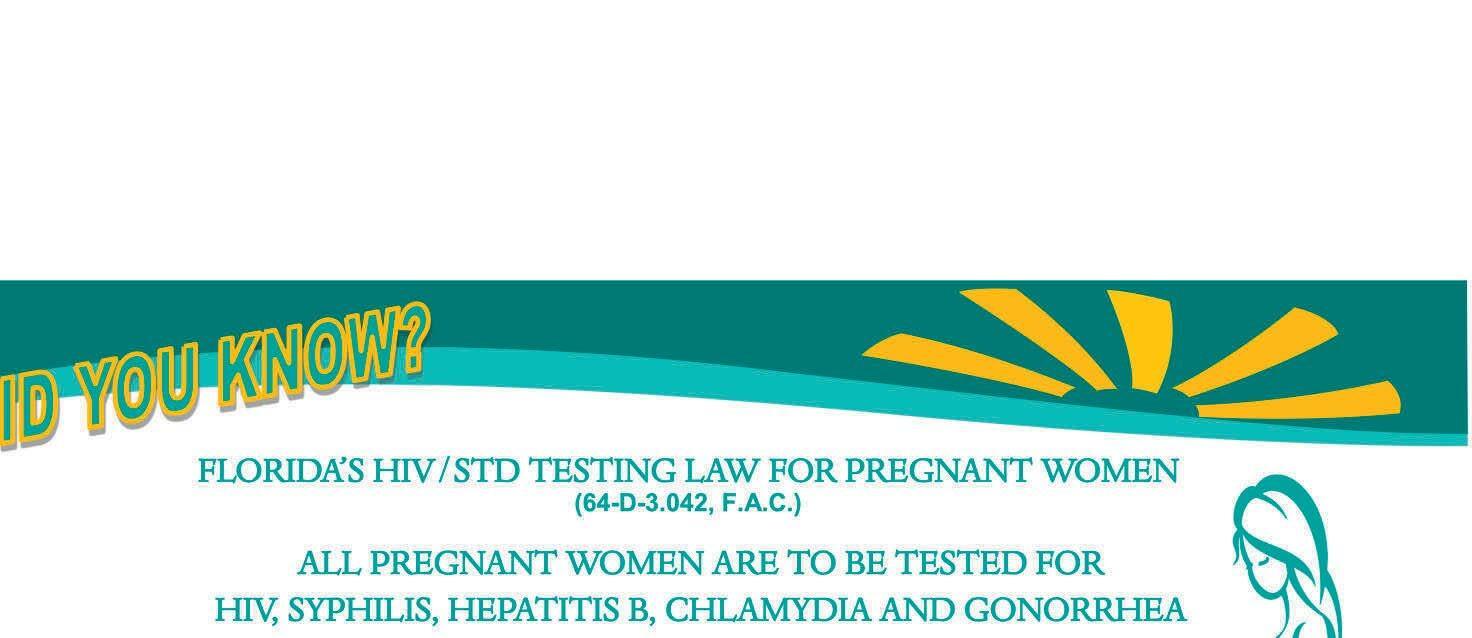

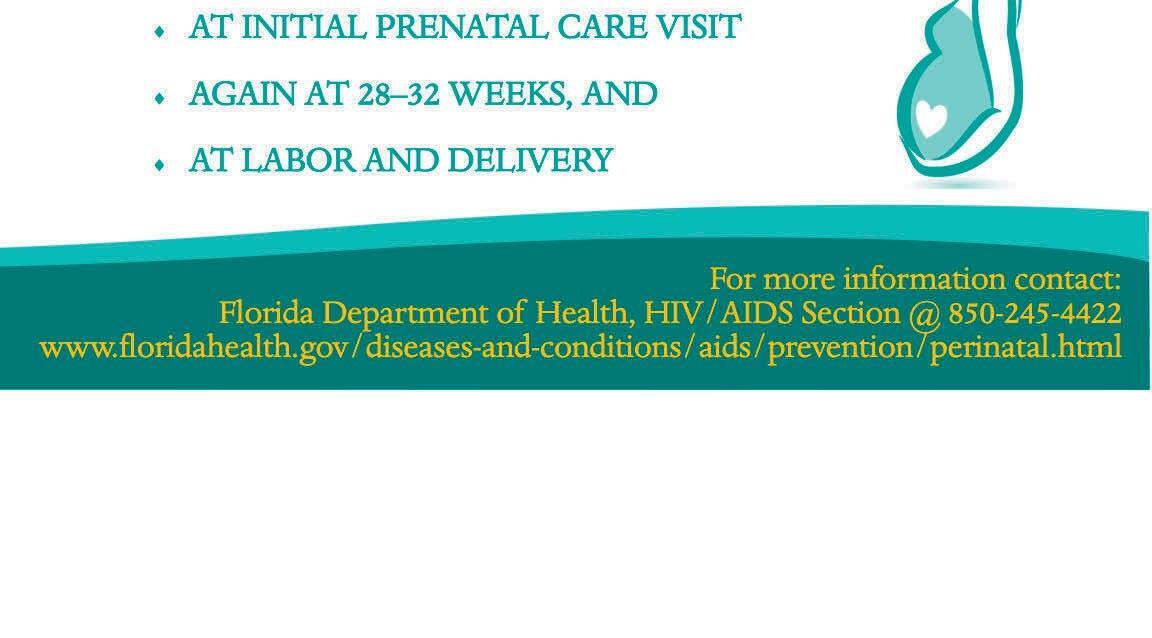
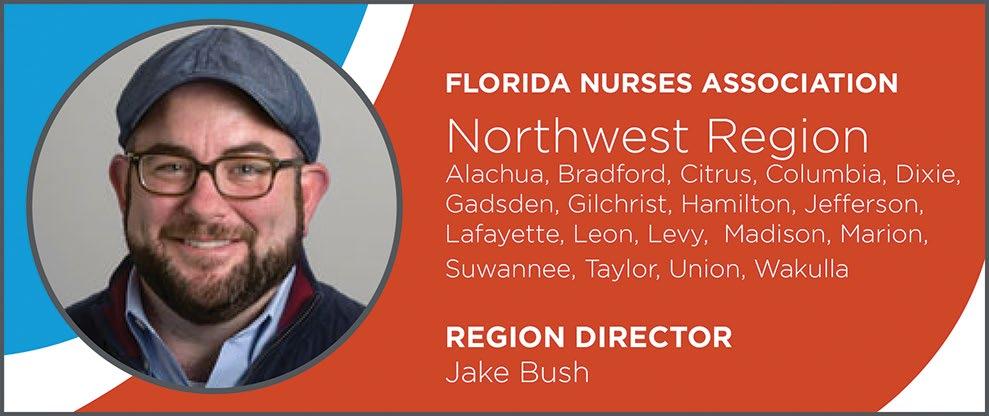
Greetings! I will be attending Advocacy Days and hope to see you there. Please let me know if you are interested in being part of the Northwest Region Leadership Council. You would be instrumental in planning collaborative events in your local area. If you would like to be part of our region’s leadership council, share any professional accomplishments, or have any regional activity ideas/questions, please feel free to contact me at info@floridanurse.org. Thank you for allowing me the opportunity to serve our region!
Dr. Jake Bush
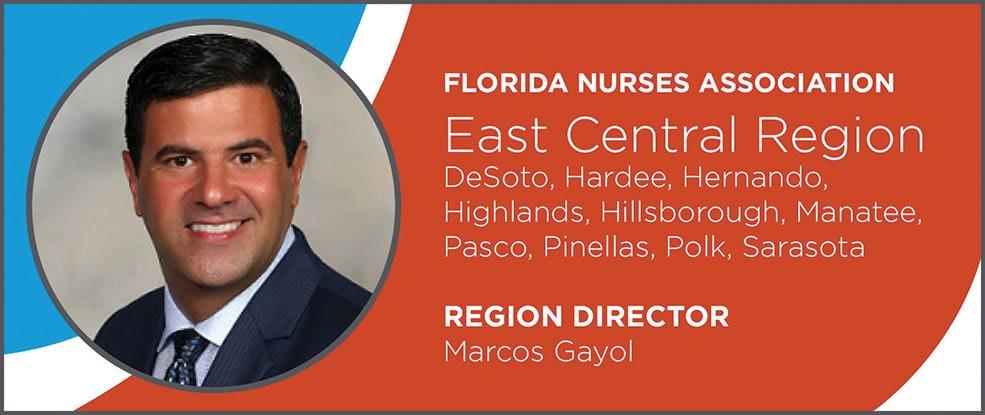
Happy New Year to all! There have been many conversations in past meetings, summits and town halls regarding the critical nursing shortage and the current vacancies in many healthcare organizations. At the time of this writing, there are over 2000 nursing positions posted on Indeed.com attributed to Flagler County, Florida. Recently, the Board of Nursing recently worked to expedite the licensure process enabling the accelerated evaluation and validation of nursing licenses. The hope is that will contribute to efforts to ameliorating the nursing shortage by facilitating the process of licensure acquisition for qualified applicants.
Our next East Central Region Leadership meetings are scheduled for: 03/23/2023 at 6pm , 07/18/2023 at 6pm, and 12/13/2023 at 6pm. Please go to the FNA event calendar (floridanurse.org/events) for information on how to join those meetings. I look forward to seeing our members for continuing discussions that impact our region.
-Dr. Marc Gayol, Ed.D., MSN, RN

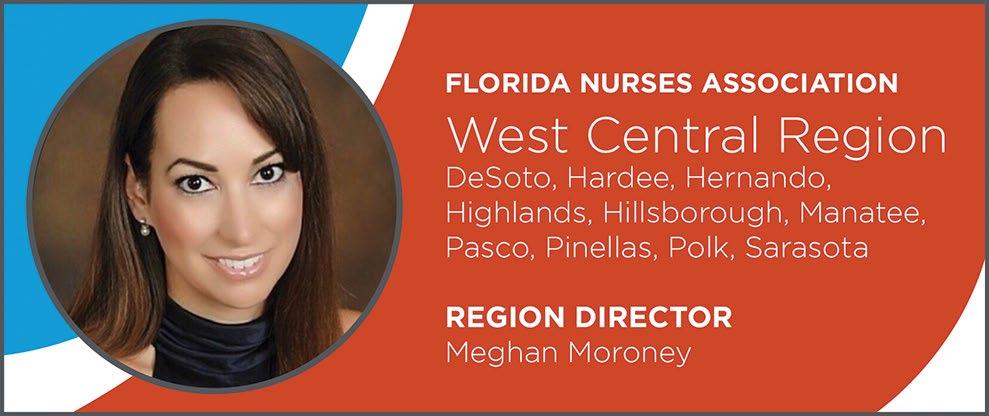
As we usher in the New Year, I would like to thank you for the opportunity to serve you and the Florida Nurses Association for your continued support and engagement. Our region successfully contributes to FNA’s mission of advancing the practice of nursing and promoting a healthy Florida!
The New Year begins with great momentum as our collective voice is represented at the State Capitol during FNA’s annual Advocacy Days. We will continue to strengthen our presence through FNA’s grassroots and legislative action as constituents within our communities. Additionally, we will establish and maintain partnerships with Nursing programs throughout our entire region. 2023 will enhance last year’s successes and highlights and I look forward to meeting you during WCEN Region’s quarterly leadership meetings!
Here are some of the highlights from our region last year:
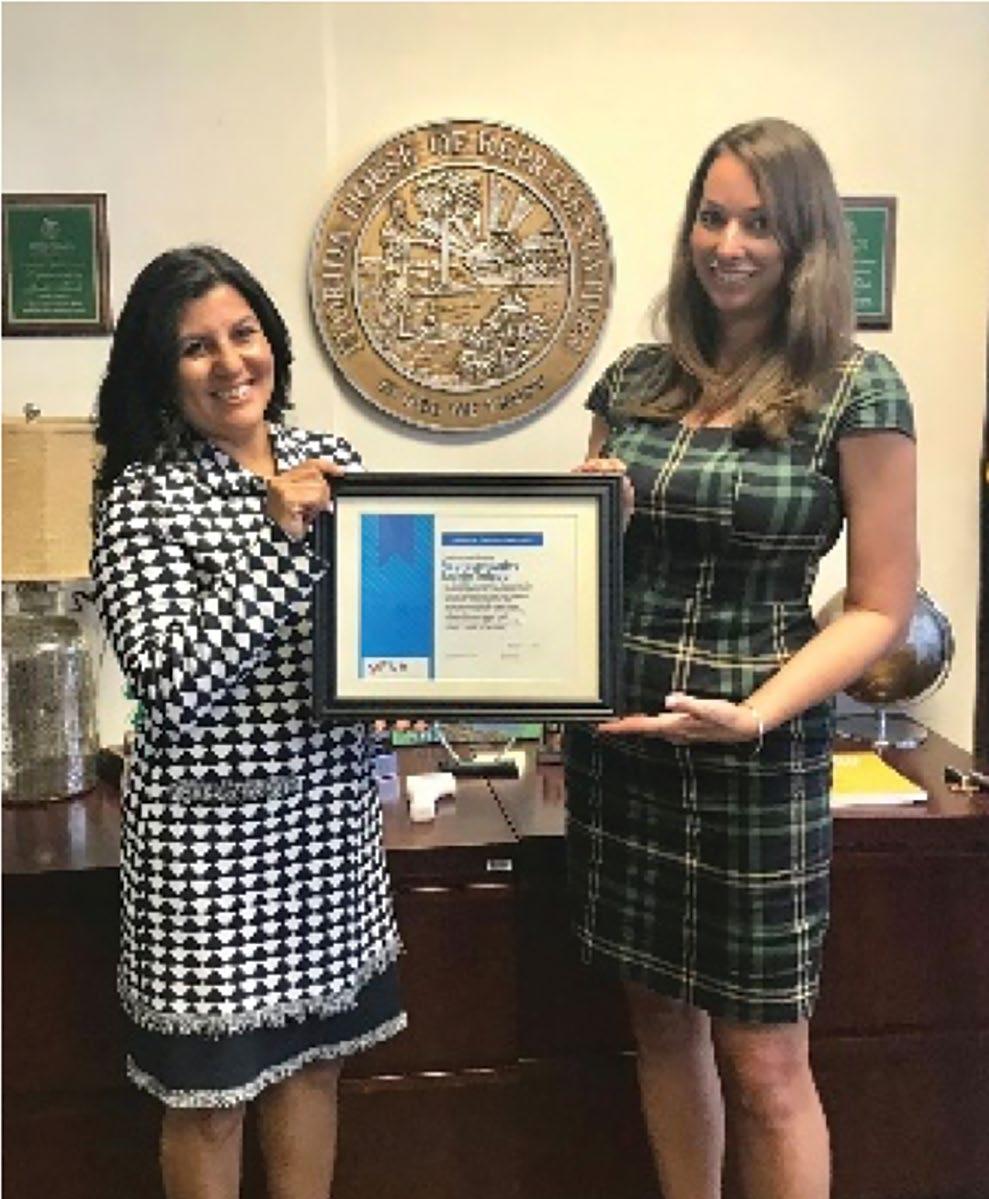

The highlight of our first quarter is owed primarily to members’ grassroots advocacy and legislative efforts. State Representative Fentrice Driskell (House District 63) sponsored FNA’s bill and the Florida Center for Nursing was reestablished at the University of South Florida on September 1, 2021. State Representative Jackie Toledo (House District 60) was presented with the FNA Legislative Champion Award for her continued support of FCN funding.
Second quarter collaborations between FNA and Nursing faculty (NSU, USF, Utica University, St. Petersburg College) were made possible by WCEN Region members’ affiliations and introductions. As a joint venture, NSU and FNA hosted a week long CEU webinar summit to celebrate Nurses Week May 9-13, 2022. FNA’s 2022 Legislative and Regulatory Policy Platform & Grassroots program was presented before both Nova Southeastern University FNP & PMHNP Class of 2023 & 2024 and University of South Florida St. Petersburg’s BSN Class of 2023.
FNA participated in the University of South Florida’s Diverse Professional Nursing Organization Expo held May 19,2022. The event was hosted by WCEN Region member Ivonne Hernandez PhD, RN, Chief Officer of Diversity, Equity and Inclusion.
FNA’s 2022 Membership Assembly was held during third quarter. The theme was Empowering Nurses Leading Change. WCEN region’s growth, strength, and community spirit embodies such empowerment. Congratulations to our WCEN region members who were nominated by their peers and awarded for excellence within their areas of nursing practice!
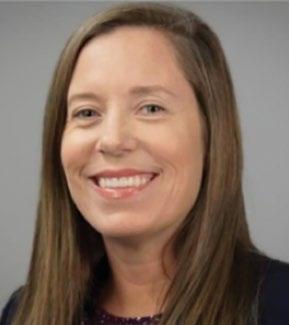
We are still seeking applicants to fill the position of Southwest Region Director for the remainder of the 2023 term (ending September). Candidates should be FNA Members in good standing who reside in the Southwest Region (includes Charlotte, Glades, Lee, Hendry, and Collier counties).
FNA Region Directors are the communication conduit from the Region to the Board of Directors. They also work with FNA Staff to plan events for the region. You should also be available by email for discussions as needed.
To apply, please email Iris Lopez, Executive Assistant at info@floridanurse.org for additional information.
We thank Camille Baldwin for her service to FNA and the FNA Board of Directors. She is a long-time member as well as a long-time supporter of FNSA as a consultant. We look forward to working with Camille in the future.
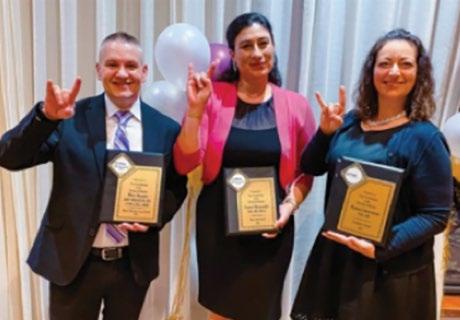
2022 FNA Nurse Educator Icon AwardMarc Rosales DNP, MBA, RN, CCRN, CNE, CHSE 2022 FNA Mary Cash AwardIvonne Hernandez PhD. RN. IBCLC 2022 FNA President’s AwardRayna Letourneau PhD, RN 2022 FNA Nursing Innovation and Creativity Icon - Dr. Allyson Duffy PhD, RN
FNA joined the Florida Chamber Political Institute during fourth quarter, enhancing FNA’s year-round nursing and legislative advocacy. Gov. DeSantis approved over $150,000 million for Nursing Funding, including $5,000,000 recurring for FCN from the state budget. The FNA Legislator of the Year Award was presented to Senator Ed Hooper (District 16) who sponsored the Florida Center for Nursing appropriation request.

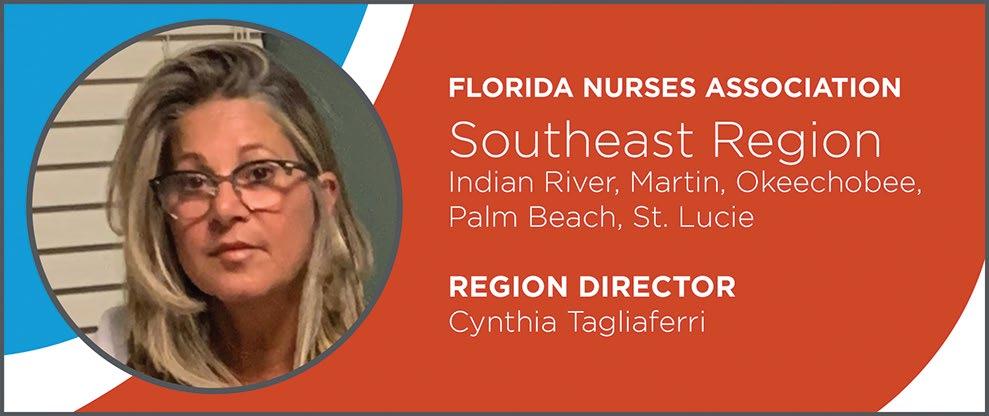
Greetings SE Region members!
2023 is being kicked off to an eager start with our focus on Legislative Advocacy and Grassroots Outreach. January brought about immediate participation in face-to-face meetings with our local legislators at the Board of County Commissioners meetings in Martin, St. Lucie, and Palm Beach Counties, as well as the Palm Beach County Legislative Delegation public hearing meeting on January 12th. The January 12th Community Town Hall meeting with Senator Bobby Powell and House Representative Jervonte Edmonds held in Palm Beach County District 33, was also well attended, included members of our SE Region and our Legislative Committee. Well done SE Region!
The SE Region will continue our grassroots efforts in the legislature by participating in the 2023 FNA Advocacy Days this February 7-9 in Tallahassee, FL. During the conference, we will be meeting with our elected officials at the Capitol to discuss FNA’s key issues. Our Region coordinated a joint effort with the South Region to arrange bus transportation to Tallahassee for members attending the conference.
Join us! Our monthly zoom membership meetings continue to be creative and productive and are scheduled for the 3rd Wednesday of each month, throughout this year, from 6:30 – 7:30pm, with the recurring link being sent to you via your FNA email. We are currently accepting volunteers for our 2023 committees. Opportunities exist on our legislative committee, events planning committee, and new committees being formed. There is always room for member involvement, so I look forward to seeing you there!
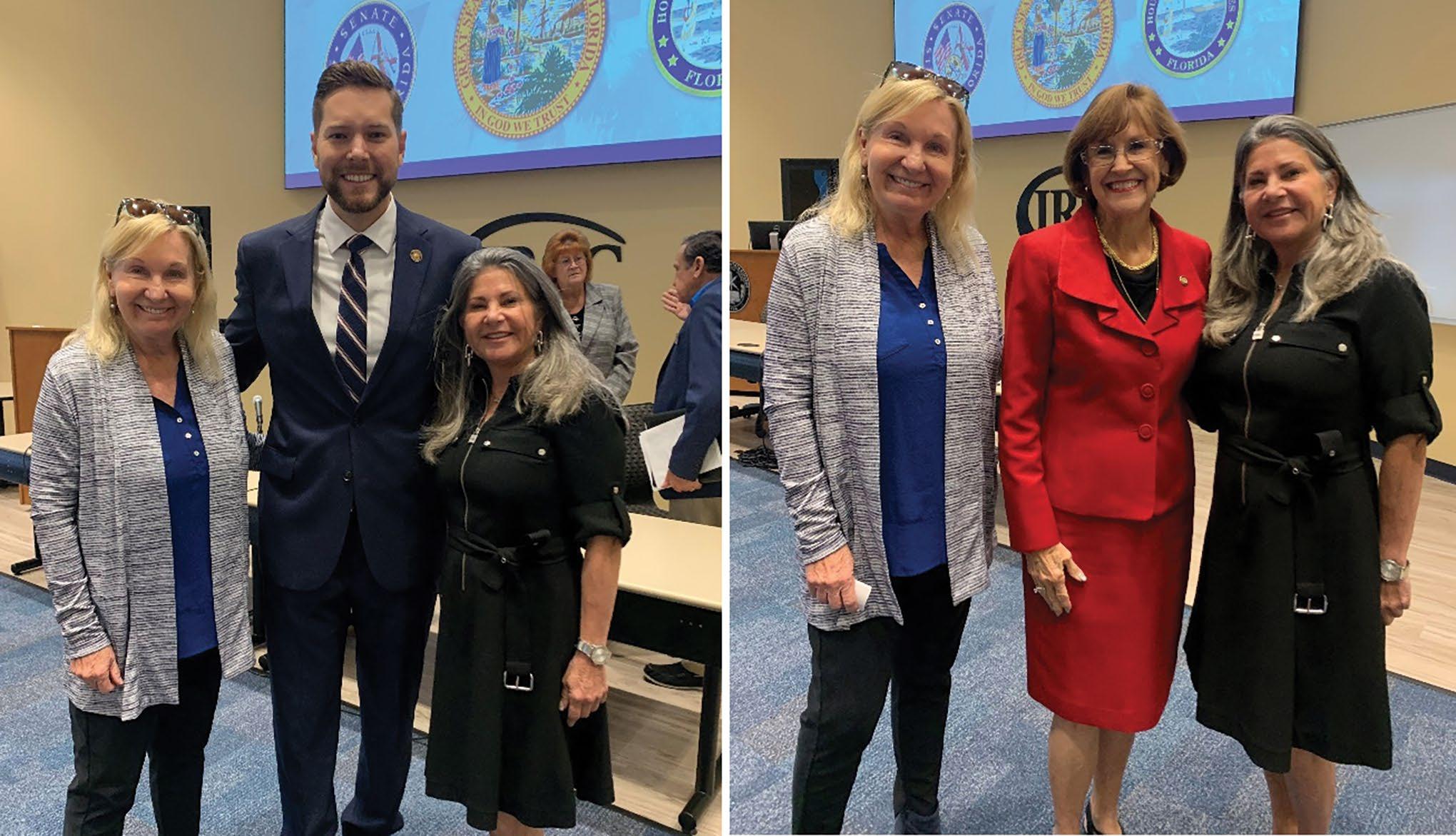

Greetings South Region Members and Nurses Across Florida,
The goal of South Region is to support the Mission of the Florida Nurses Association by “Advancing the profession of nursing and promoting a healthy Florida.” South Region members have been gearing up for 13th Annual South Region Symposium and Awards Ceremony scheduled for April 22, 2023 at Gulfstream Park in Hallandale Beach, Florida.
This is the time that nursing students, faculty, hospital and community nurses, administrators, and others are recognized for their efforts and impact on the nursing profession. At this event, nurses across south Florida will be
presenting their research during our digital poster sessions. Please consider submitting a nominee for one of these awards as well as applying for a nursing scholarship. Please mark your calendar and plan to attend. We will have several dynamic speakers to share the latest in nursing advances, as well as updates on climate change. Our theme for the 2023 Annual Symposium is “The Future of Nursing Leadership: Advocacy and Activism in Action.” Detailed information about the South Symposium including registration, awards nominations, poster abstracts, and scholarship opportunities can be found at www.floridanurse.org/SouthSymposium23
Linda Washington-Brown, PhD., EJD, APRN-C, PNP, FNP, ANP, FAANP, FAAN
American Nurses Association, Minority Fellow, Alumna Post-Doctoral Fellow, University of Pennsylvania, Center for Women, Children, and Families, Alumna Director, Florida Nurses Association South Region Vaccinations Clinical Coordinator, Caring Place Clinic
“Tell me and I forget, teach me and I may remember, involve me and I learn” – Benjamin Franklin
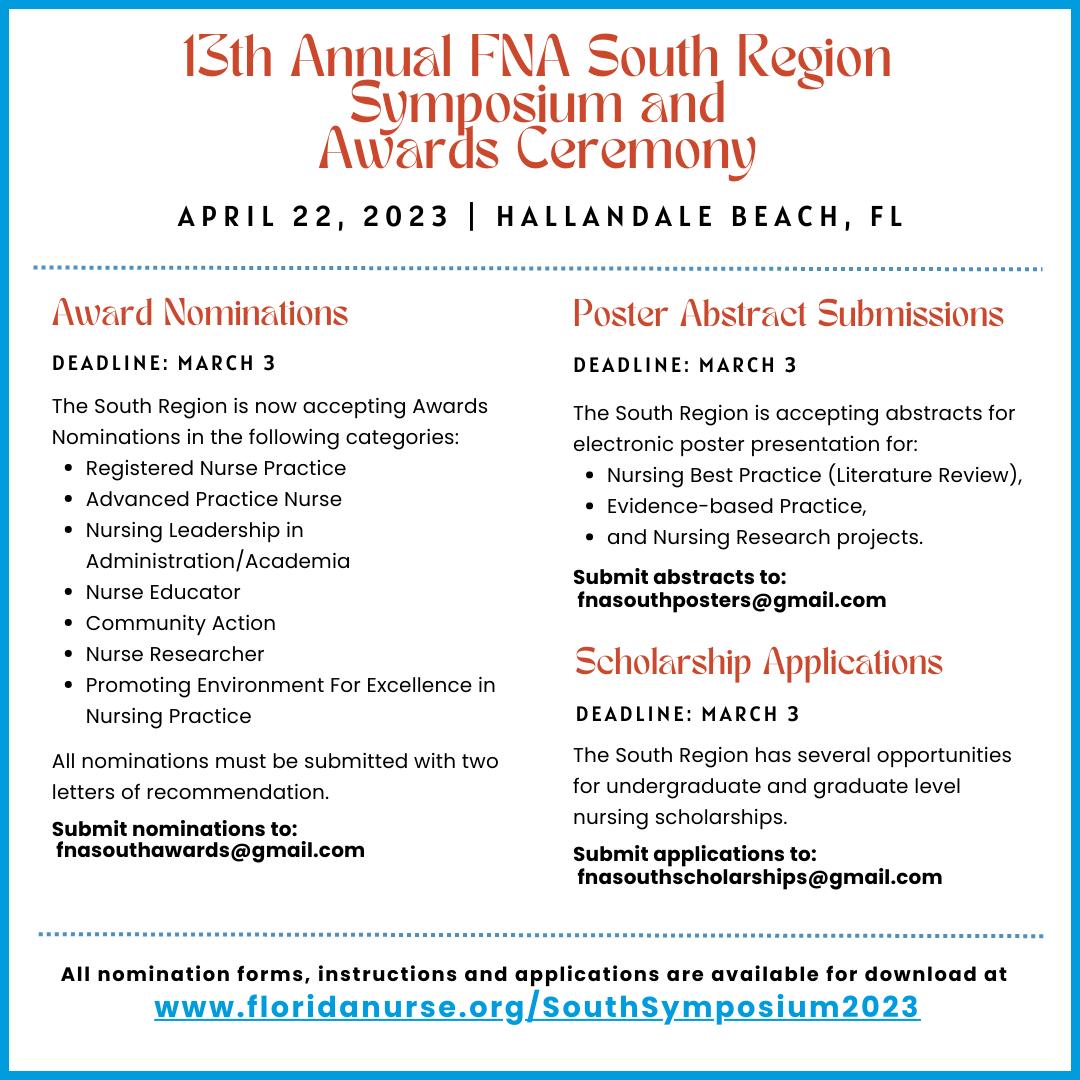



The FNA Nominating Committee is seeking nominations for leadership positions for the 20232025 term. All positions on the FNA Board of Directors are open for nomination. Additional opportunities include service on the Nominating Committee and as Representative to the ANA Membership Assembly. Board members will be sworn in and begin their term at the 2023 FNA Membership Assembly in September. The Board of Directors meets quarterly each year and attendance at the meetings is mandatory. The board is responsible for high-level decision making and authority
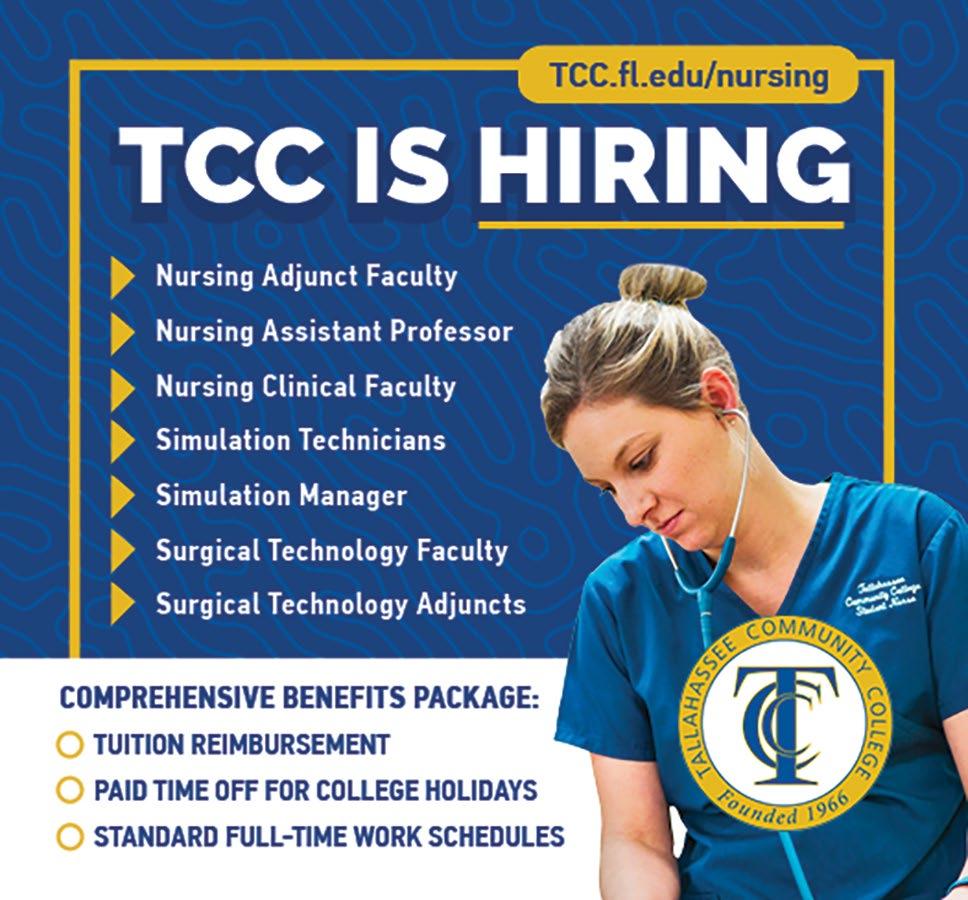
in steering the association. Board members are also asked to weigh in throughout the year on various issues so it is important that they have the ability to respond to requests in a timely manner. Participating in an official capacity allows you to contribute your voice to the nursing profession and adds to your leadership experience.
Having a diverse Board of Directors with members from various backgrounds and areas of practice is important to represent the voice of nurses and FNA members. Nominees don’t need prior board experience to serve. Nominees from all backgrounds are encouraged to apply as long as they are able to fulfill the obligations of the position.
The FNA Nominating Committee will be hosting “Leadership Bootcamps” to help prepare nominees and anyone else interested in board service. The webinars will be added to the calendar and announced soon.
More details will be posted on the FNA website.
Please visit the FNA Election Headquarters at www. floridanurse.org/Election for detailed information about the nomination process and the responsibilities of each position.
FNA is seeking nominations for the following Board of Director positions:
• President-Elect: Acts as an assistant to the President and assumes the duties of the President in his/her absence.
• Vice President: Chairperson of the FNA Membership Committee and assumes the duties of the President in the absence of the President and President-Elect.





• Secretary: Records the minutes of the FNA Board of Directors (BOD), Executive Committee, and Advisory Committee meetings.
• Treasurer: Serves as Chair on the Finance Committee, reports to the BOD the financial standing of FNA, and makes a full report to FNA at each Membership Assembly
• Region Directors (8): Serve as liaisons between the FNA Board of Directors and the Regions. Assist in coordinating FNA regional events.
• Director of Recent Graduates: Serves as the chair of the New Graduate Special Interest Groups. Assists in coordinating programs and events targeted towards recent nurse graduates.
We are also seeking nominations for the following leadership positions (not part of the Board of Directors):
• Nominating Committee (5): Oversees the election process and formulates the ballot in conformity with the FNA Bylaws. No region shall be entitled to more than one member to serve on this committee. No member shall serve concurrently on the Nominating Committee and on the BOD.
• Representative to the ANA Membership Assembly (2): Serves as a delegate representing Florida at the annual ANA Membership Assembly
To apply, please review the Election Manual online and submit your nomination form by Friday, April 7, 2023.
• Enjoy work-life balance with no overnights, seven paid holidays, and PTO that starts immediately.
• Receive FREE laser hair removal for you and your spouse or legal partner.
• Help clients become the best, most confident versions of themselves with real results.
• Experience in aesthetic nursing isn’t required — we’ll train you, and you’ll have opportunities for new challenges and continued mentoring!




























The 2023 Legislative Session is quickly approaching! It officially begins on Tuesday, March 7 and runs for 60 consecutive days. According to the Florida Constitution, the legislature has only one duty and that is to pass a balanced budget. The current financial situation is above expectations, so the budget should not be a difficult thing to accomplish. Additionally, legislators file proposed legislation that will be considered during session. During 2022 Session, over 3,000 bills were filed addressing a variety of issues!

The House members are limited to seven bills and the Senators can file an unlimited number of bills. For a bill to pass the legislature, there must be companion bills filed in both Chambers. With the limitations of bills one can file in the House, you must start early in the process to find a Representative to file your legislation. Thankfully, we were able to secure a bill sponsor in the House for one of your legislative priorities. Representative Marie Woodson (D) has agreed to sponsor the FNA Surgical Smoke Evacuation Bill. She is a member of the House Health and Human Services Committee and the House Health Care Appropriations Subcommittee.
Senator Ileana Garcia (R) will be the Senate bill sponsor. She is the Chair of the Children, Families and Elder Committee and Vice Chair of the Senate Appropriations Committee on Health and Human Services. Senator Garcia is also a member of the Health Policy Committee.
Bill filing deadlines have passed so now we are viewing bills being filed. The last day to file bills is March 7, the first day of session.
There are three interim committee meeting weeks in February. The legislature will take a break and not meet during the last week of February. They will be back in their districts. This is another great opportunity for you to meet with the legislators in their district office and let them know about the FNA Legislative Priorities!
FNA held its annual Advocacy Days in early February. This provided FNA members a great chance to come to Tallahassee and see the process in action. Participants were able to share the FNA Legislative Priorities with their legislators and staff during their visits to the Capitol.
We want to thank the FNA members who took the time out of their busy schedules to attend Delegation Meetings. You helped educate many members of the Florida Legislature about the nursing profession and the FNA Legislative Priorities.
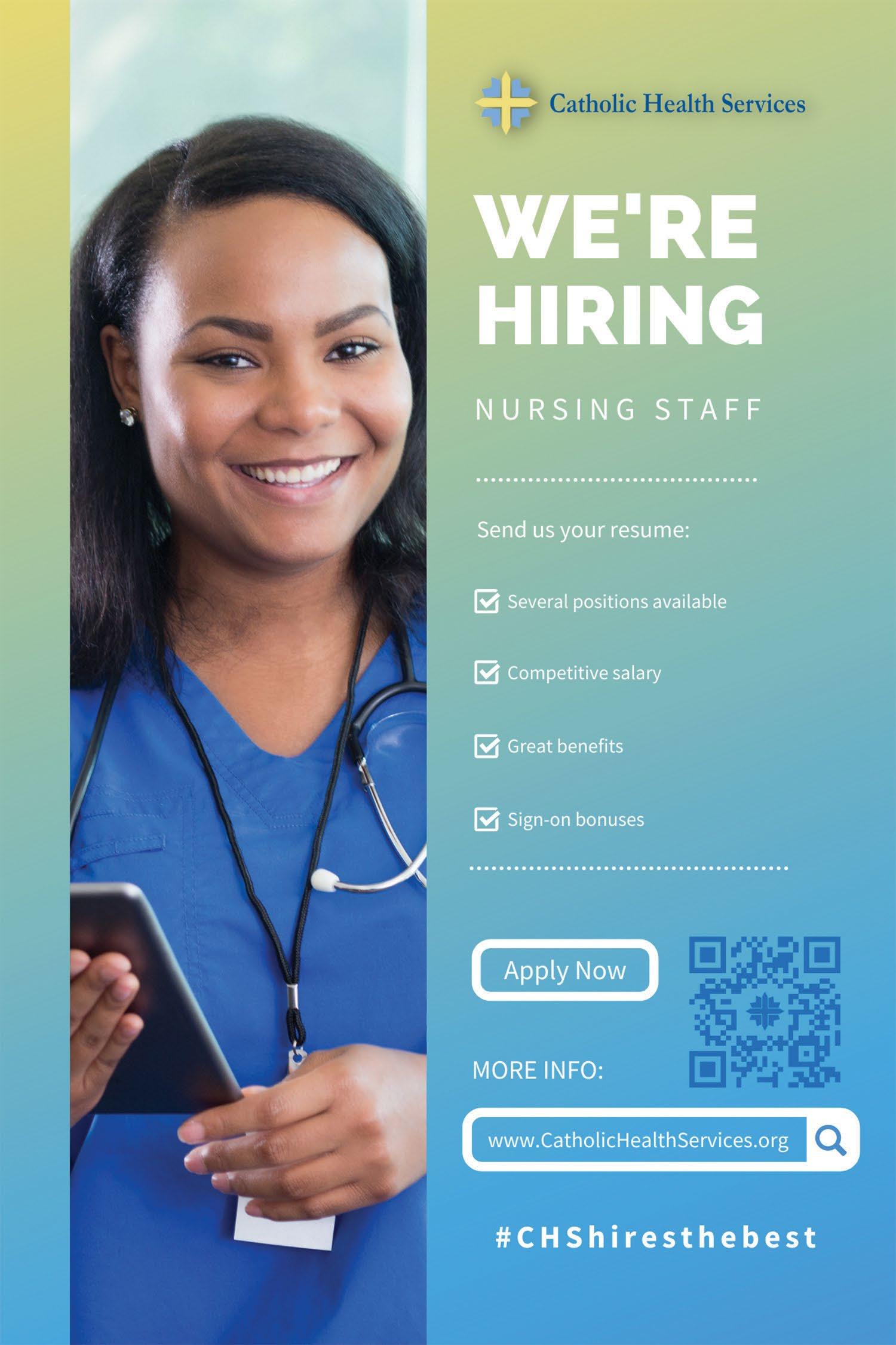
FNSA Chapters across the state have been dealt a heavy blow during COVID-19. In spite of that fact, they were able to hold the first face-to-face meeting in two years with over 800 students and 20 exhibitors attending. In spite of the challenges, a new board was elected and they were able to conduct business in the House of Delegates. Because of the events of the past two years, the students have lost contact with consultants, leaders and chapters. We are already working on the 2023 Convention with a target day at the end of October as usual. We are having some difficulty finding a venue due to the size of the conference and the space requirements but we are certain we can find a location. We do expect that room rates may be trending higher but we continue to negotiate with school and student budgets in mind.
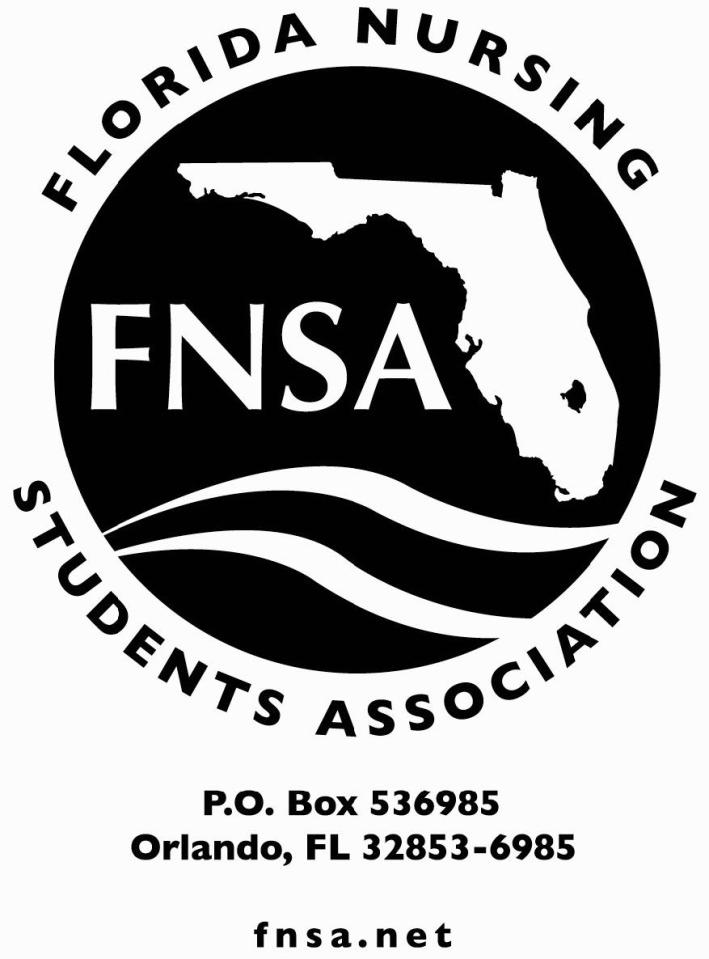
In order to help us with our rebuilding efforts, we are asking schools to contact us with their faculty consultant(s) name and email and the roster of all your chapter officers; President, Vice President, Secretary, Treasurer and any other officers you elect. It would also be helpful if you could send the name and email of your Dean or Program Director. There have been many changes over the past two years.
Please email this information to Kelly York, President at fnsapresident2023@gmail.com and Willa Fuller at wfuller@floridanurse.org
Please be on the alert for a packet From FNSA also seeking this information. FNSA has been one of the top performers on the state and national level for many years having won the State Excellence Award seven times. They have also consistently had the highest (or second highest) number of delegates to National Convention for 20 years running. We are confident that we can rise to that level of activity again. In 2022, we had the highest number of delegates at the most recent NSNA convention so we are back on track to rebuilding. We look forward to hearing from you with your information.

 John Berry, Director of Labor Relations
John Berry, Director of Labor Relations
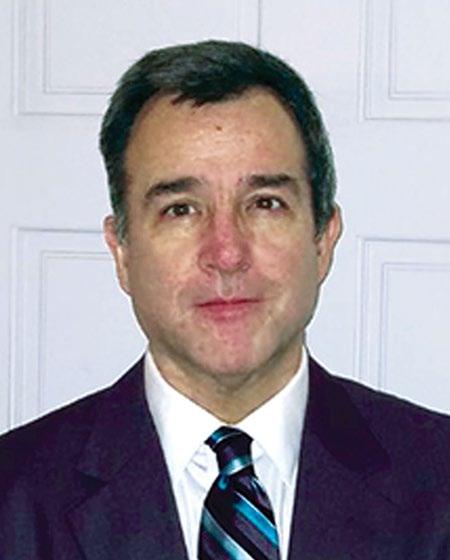
It’s that time of year again. As new leadership take the reins in the Florida House of Representatives and Senate, so do our continued efforts to educate our elected officials regarding the legislative priorities of the Florida Nurses Association. We become advocates because we are passionate about a certain issue or cause that can personally affect us or others such as the patients nurses care for. There are no finer advocates than nurses when they are fighting for the care and safety of their patients. But the fight must extend beyond the workplace. Nurses must take that advocacy to the halls of the legislature in Tallahassee. FNA’s Advocacy Days are scheduled for February 7-9, 2023. For those of you who have never attended in the past, I strongly encourage you to consider this in the future. Legislators need to hear the personal stories from nurses on their daily experiences in their health

care institutions across the state, to ensure that proper funding is provided to their facilities for patient care, for programs, and for their safety and their practice.
As nurses, you are consummate professionals and display the utmost confidence in everything you do when advocating for your patients. But in unfamiliar surroundings, such as when first addressing a legislator you may feel a little uneasy. Start out by introducing yourself to the legislator or his/her staff person. If you’re a constituent, make sure that you acknowledge that. We may not feel it at times, but as constituents, a person who can vote for them, your word carries a lot of weight. Your voice can represent your vote, your family’s vote, your friend’s vote, your colleague’s vote and even an acquaintance’s vote. That’s how you’re viewed by an elected representative. Whether it’s a local, state, or federal legislator, he or she is aware that you have the power to elect them into office or perhaps to vote them out. Tell them where you work, what your job title is, and how long that you’ve worked there. You need to tell them your story, to educate, to make an impact on that legislator so that he or she has the proper information and knows how they should be voting on a particular piece of legislation. Sometimes you might not get to speak with the elected official because they could be in session already that day or in a committee meeting. It’s great to speak with your representative, but if you can’t, don’t be disappointed. There are plenty of staff that are well versed on the subject matter. When your meeting concludes, make sure that you thank them for their
time, and let them know that you can forward them any additional information that will help them make their decision on how to vote on the legislation that you’ve discussed. Also, make sure you leave your contact information as well and volunteer to be their resource for nursing information.
Governor DeSantis has already publicly let it be known that one of his top legislative priorities, will be targeting the Teacher’s Union in the 2023 session. What may not be evident is that every other labor organization, except for the Police, Fire, and Corrections, are included in the legislation as well. There is not a specific bill number or sponsor yet, but this bill will be introduced during this session and can adversely affect colleagues who are state employees. There’s a bill introduced every year in the six year’s that I’ve had the privilege to be here, and we’ve been fortunate enough each year to work with the Florida AFL-CIO and the other labor organizations to fight back that bill. I’m hoping this year will be the same result.
Advocacy for your patients and health care professionals could never be at a more crucial point than it is today. A strong strategy is a phone call to your local legislator to share your concerns. You can also send an email or write a letter or even make an in-person visit to the legislators’ district office. Whatever you do, don’t sit on the sidelines waiting for someone else to do it. Please do your part, advocate for yourself and your patients and get involved. Go to FNA’s Legislative page to find out more about how to communicate with your legislators.
We know that this has been a challenging time for you as you work every day to protect all of us here in Florida. Thank you for your dedication and hard work. Know that your FNA Team will continue to work hard to protect your workplace rights!
What is ahead for our Bargaining Unit? Your new officers and the Staff of the Florida Nurses Association continue to negotiate with the Governor and the Legislature to secure a wage increase and protect your rights at work. FNA Advocacy Days in February gives us an opportunity to talk directly with our Legislators and educate them about the important roles that you, our Health Care Professionals, play to protect our Florida residents and the wards of the state. Increasing our membership is essential. The state needs to see that our professional health care employees believe in their Union and their right to
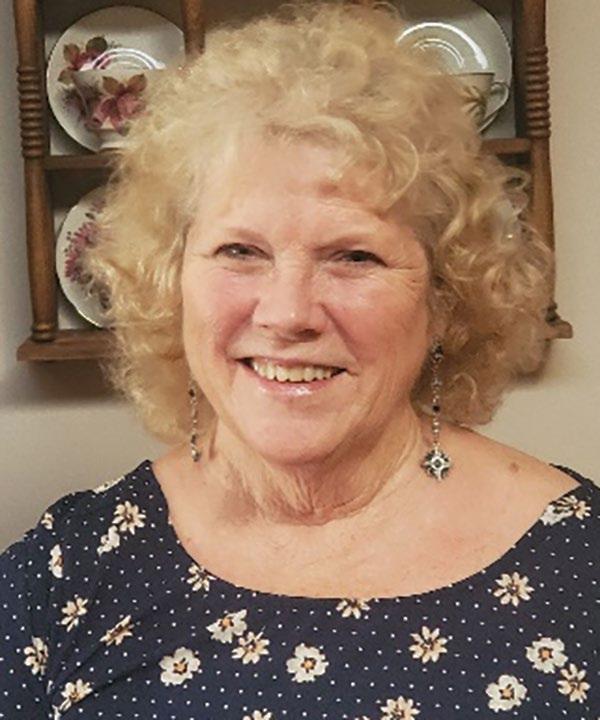
collectively bargain with their employer. Unions that succeed have a high percentage of membership within their ranks which sends a message of political strength and funds a treasury that can support aggressive lobbying and legal action when needed. Support this goal by maintaining your membership and encouraging your co-workers to join too!
Do you want to become even more involved? We need members at each work site to maintain our FNA bulletin boards. The contract provides for a bulletin board at each workplace, so that we can keep our members informed by posting updates on the board. Do you know where yours is? Does it need updating? Will you join us serving in this role at your place of work? You’ll have plenty of help from the FNA staff! Please contact John Berry at jberry@floridanurse.org, and Bibi Lowton at govt@floridanurse.org and they will arrange to send you any handouts you may need.
In Solidarity, Debbie Hogan, RN, MPH FNA HCP Bargaining Unit
With Florida in the midst of a significant shortage of nurses, the Florida Center for Nursing — headquartered at USF Health’s College of Nursing — has never been more important.
Established in 2001 by Florida lawmakers, the center was housed — as a separate entity — at the University of Central Florida until it closed in 2020 due to a lack of funding.
“The toll that the pandemic was taking on the nursing workforce was astronomical,” says Rayna Letourneau, an assistant professor in USF’s College of Nursing and interim executive director of the center. “People started looking for data that wasn’t being collected anymore because the center had closed. It’s difficult to make decisions without data and the absence of the center was felt massively across the state.”

In 2021, the Florida Nurses Association secured state funding to re-establish the center for one year in partnership with USF. Because of its success and the continued need for attention to the nursing workforce, this year’s state budget included $5 million in recurring funding to support the center as part of the College of Nursing.
“We analyze different state and regional data that will help us determine supply and demand,” Letourneau says. “For example, last academic year we surveyed all of the practical and registered nursing programs in the state. We collected data about each program, such as faculty and student demographic characteristics, in addition to the capacity of each nursing program, to provide information about supply and the pipeline into the nursing workforce.”
The center also evaluates data for pass rates on registered and practical nurse licensure exams, license renewals by nurses and employer data.
Letourneau notes that first-time success rates on the National Council Licensure Examination provides information related to the pipeline of new graduates into the nursing workforce.
“If new graduate nurses do not pass the exam, then they cannot practice as a licensed registered nurse and will not help to build the competence and capacity of our nursing workforce,” she says.
Florida’s pass rates on the exam have been below the national average for a few years. In 2021, the national pass rate was just under 83%, while the state’s was slightly below 65%. (USF’s pass rate was 91% in 2021.)
“The alarming state pass rate warrants the Center for Nursing to take a deeper dive into the state’s data,” Letourneau says. She is focused on two major goals.
“The first is to develop a strategic statewide plan for the nursing workforce in Florida,” she says. “In order to do this, the center must collect and analyze data, then disseminate the findings. The other goal is to enhance promotion of the nursing profession, including recognition, reward and renewal activities for nurses across the state. We want the public to have a better understanding of what nurses do, so being able to promote nursing and recognize all of the excellence within our profession are important.”
The Florida Nurses Association (FNA) applauds the actions of The Federal Bureau of Investigation (FBI) and the Justice Department in cooperation with the National Council of State Boards of Nursing (NCSBN) and The Florida Board of Nursing (FBON) for its investigation and the current actions related to the nursing education programs which engaged in fraudulent activities associated with education and licensure.
FNA, as well as other nursing groups in Florida have had lengthy involvement in working with the greater nursing community to promote quality education efforts as well as the delivery of safe nursing care in Florida. We have voiced our concerned when we felt standards were not being upheld and we have supported efforts to strengthen processes and procedures related to licensing and credentialing. One of the hallmarks of nursing education programs is to socialize potential nurses regarding the high ethical standards of the profession and the importance of the sacred trust between nurses and the persons they deliver care to.
These events are highly disturbing; however, this serves as an opportunity to make improvements so that public confidence in our profession is not irreparably damaged. As the continual frontrunner as the Gallup Polls “Most Trusted Professions” for 21 years, we will continue to be vigilant around this issue and we will stay committed to our mission of Advancing the profession of nursing, and promoting a healthy Florida.
The National Council of State Boards of Nursing (NCSBN) applauds the U.S. Department of Health and Human Services—Office of Inspector General (HHSOIG), the Federal Bureau of Investigation (FBI) and the Justice Department for their important work on Operation Nightingale. The investigation focused on nursing education programs that were allegedly involved in the sale of false and fraudulent nursing education credentials.
With public safety and welfare as a top concern, NCSBN and our member nursing regulatory bodies partnered with federal and state authorities, helping to identify and monitor individuals who allegedly provided these illegitimate transcripts and credentials that could potentially undermine safe patient care.
Nursing regulatory bodies in affected states have been investigating individual cases and are taking appropriate action, in accordance with their state laws and due process, that includes loss of license.
As the world leader in nursing regulatory knowledge, NCSBN is dedicated to protecting the public and will continue to support our member nursing regulatory bodies as they thoroughly investigate each case, taking the necessary actions to ensure public safety and root out the fraud involved in this case. NCSBN is committed to helping our members identify any additional safeguards and solutions that are needed.
This situation speaks to the importance of nursing regulation and the collective duty to protect the public. NCSBN will continue working with all appropriate nursing regulatory bodies, nursing education program providers, accreditation bodies and authorities to detect, investigate and resolve these matters today and into the future.
Most of our SIG’s are off and running for 2023. The Holistic Nurses SIG has been meeting for the past two years and has initiated a project to develop a website as a resource to nurses.
The website may be found at www.floridanurse.org/ NurseZenZone This is a work in progress and we look forward to feedback from the members which could include other ideas and other resources to add to the website. Please feel free to send links and suggestions to Iris Lopez at info@floridanurse.org
The SIG is also interested in best practices by healthcare facilities to create a positive work environment for nurses. Please share your positive stories with us so that we can create a “Best Practices” section of the website as a resource to nursing workplaces.
Since we completed this project, attendance at meetings has waned with the last few meetings only being attended by students. We are trying to determine what the interest is in maintaining this SIG. We have conducted a survey of over 300 members who signed up for the SIG, but have only heard from 11.
We would like those who have participated in the past to go the survey and complete it to let us know what direction to take as it is unclear at this time. Our policy states that a SIG only needs 10 members to operate but that is not possible if they do not attend meetings. To indicate your preference regarding this SIG, please go to https://www.surveymonkey. com/r/HolisticSIG

Thank you to the members who volunteered to work on our 2023 committees.
Bylaws:
Cynthia Devine, Savannah Hoover, Stefanie LaManna, Stephanie Ortega, George Peraza-Smith, Katherine Spence
Awards:
Marsha Elson-Joseph, Nola Holness, Shavondra Huggins, Roseann Maresca, Brenda Naumovitz, Ruth Neese, Luzmary Ocampo, Yamiley Theodore
Membership Assembly:
Andrew Davies, Shirley Gordon, Alfa LaFleur, Barbara Minor, Maritess Quinto, Angela Starkweather, Jennifer Stone
Reference:
Lygia Arcaro, Jocelyn Martinez, George Peraza-Smith, Patrice Skjerve, Gina Teegarden, Louise Waszczak
Membership:
Jennifer Crews, Debbie Hogan, Lois Marshall, Heather Mirch, Aushaunte White


Recent Graduate Advisory Board is Essential to our FutureSECOND REQUEST
Recently, we found that a significant portion of our membership has been in practice five years or less, which was a wonderful discovery. With that revelation, we really started to examine what we could offer specifically to new graduates as they begin their careers or as they transition at different points in their careers.
It was determined that it would be best to work with new graduates (for our purposes, nurses who have been in practice 5 years or less) to determine what their needs are as well as what strategies would be effective in engaging recent grads. We are seeking to form an Advisory Board made up primarily of recent graduates with the goal of developing programs and products to support these valued members.
Additionally, we are still in need of a Recent Graduate to serve on the FNA Board of Directors. This should be an entry level RN who is still practicing in direct care and has been a nurse for five years or less. They must also be an FNA Member in good standing. This is full voting position on the board and you will be asked to Chair the New Grad Advisory board as well as the New Grad Special Interest Group which could be merged into one group. You will have staff and board support so that this position will not be overwhelming but you would attend the meetings of the board which are primarily virtual and you will be supported to attend the Annual Membership Assembly. If you are interested in participating in this group, it will meet virtually (unless the group decides otherwise) to facilitate immediate action on these issues. Please email Iris Lopez at info@floridanurse.org to let her know of your interest.


SILVER SPRING, MD - Today the American Nurses Association (ANA), the premier association representing the interests of the nation’s more than 4.4 million registered nurses, welcomes its newest president, Jennifer Mensik Kennedy, PhD, MBA, RN, NEA-BC, FAAN. She brings more than 25 years of nursing experience to the ANA presidency and has devoted more than a decade of service to ANA, providing leadership in highprofile positions such as ANA Committee Treasurer and service on ANA’s Board of Directors while maintaining membership with the Oregon Nurses Association. Dr. Mensik Kennedy is ready to continue work to address some of the most pressing issues facing nurses: racism in nursing, the health and well-being of nurses, full practice authority for advanced practice registered nurses (APRNs), and nurse staffing.
“It is a tremendous honor to be elected to serve as the president of the American Nurses Association and as the national, leading advocate for nurses during these unprecedent times in nursing history. The COVID-19 pandemic brought significant challenges to the nursing profession, with workforce issues making national headlines despite decades of existence. I am committed to maintaining this visibility and more importantly, the momentum made to call for real solutions that address safe staffing concerns, workplace violence, and burnout to ensure nurses receive the support they so desperately deserve. I will also ensure that ANA’s work with the National Commission to Address Racism in Nursing and journey of racial reconciliation continues.
Nursing is truly my passion and calling. In addition to tackling the hard issues, I’m simply excited to connect with my fellow nurses across the country. I want to hear their challenges, but I also want to celebrate their vast contributions to society, education, public health, science, research and so much more. Working together, we can support our profession and make health care delivery the best experience it can be for our patients and communities,” said ANA president Jennifer Mensik Kennedy, PhD, MBA, RN, NEA-BC, FAAN.
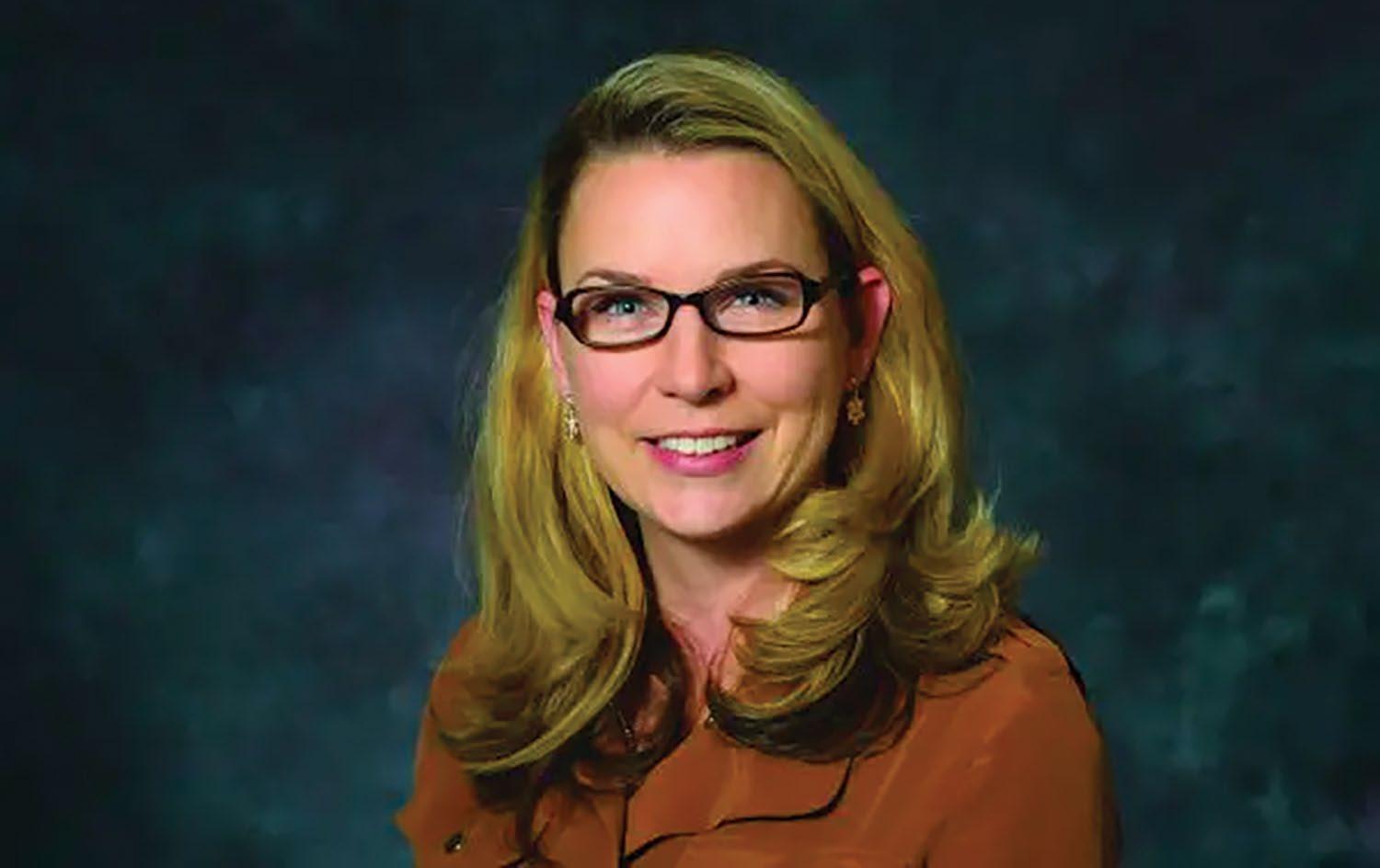
Dr. Mensik Kennedy most recently served as the division director of care management at Oregon Health and Science University in Portland, Oregon as well as an instructor for Arizona State University College of Nursing and Health Innovation. She is the proud mother of six children, and in her spare time enjoys camping and traveling with her family. To read the complete profile on ANA’s newest president visit American Nurse to read the President’s Column feature.
Dr. Mensik Kennedy is available for press briefings to discuss timely and critical health care and nursing topics and issues. Interested members of the media should email newsroom@ana.org

Learn to evaluate, diagnose, and treat health conditions, prevent disease, and promote a healthy lifestyle.
• Designed for working nurses by clinically practicing faculty
• 95% pass rate on AANC* Board Exam
• Affordable, quality education taught 100% online with no on-site visits required
Northwest
Rorielyn Barrera
Igor Bogunovic
Krista Campbell
Lisa Cuff
Tarol Douthit
Maria Fatima Espiritu
Pierreline Fortune
Akeila Hardy
Hannah Langsten
Lucy Millan
Suzanne Moree
Heather Morris
Janice Peterson
Stephanie Salazar
Shandle Sargent
Desiree Short
Vinda Soto
Deborah Stiles
Jessica Swanson
Richard Vinson
Tamakee Westbrook
Eakkawit Wetcha
Alisha Williams
Richetta Worlds
North Central
Hyochol Ahn
Meghan Bailey
Janelle Baker
Beverly Bartholomew
Courtney Belhart
Marcia Binion
Michael Boufford
John Boyd
Christie Brooks
Katelynn Brown
Michelle Castillo
Erin Caudle
Angelia Chancey
Jeta Charles
Aliyah Coleman
Shonnda Cooper
Marcus Cruce
Lauren Delehanty
Zahily Delgado Millo
Melvin Diaz Martinez
Sabrina Dickey
Ruby Rose Etquibal
Augusto Fajardo
Joseph Faller
Mary Ferguson
Dane Edward Frias
Julia Gamble
Jean Geste
Paige Gravenstein
Kristi Harrelson
Marsha Hartline
Britney Herring
Melissa Huene
Cassandra Kasper
Ruth Renae Lane
Ebony Ling
Shawna Lord
Blake Lynch
Lynda Mansfield
Rashell McFarlane
Jordan McMillan
Ashley-Marie Mendez
Jennifer Merola
Rachel Moore
Patricia Morrison
Jasmine Mount
Carol Newell
Patricia Redman
Xiomara Rodriguez Garcia
Barbara Rowland
Dianne Roxborough
Chara Sapp
Lisa Scarton
Rayon Seepersaud
Melania Sylvester
Alissa Tackett
Jacob Tymon
Crystal Tzintzun
Laura Young
Northeast Kaitlyn Allen
Kelly Arnold
Adolphus Bailey
Tina Barber
Tiffany Braddy
Lawanda Brown
Brittany Bryant
April Bryant
Mainelys Chaviano Alfonso
Thomas Costello
Rosario Coyoca
Jennifer Crews
Kwona DeVoux
Susan Elliott
Samantha Fare
Nikki Fox
Stephanie Gaafar
Angela Graham
Annette Hall
Mary Halvorsen
Melisa Henry
Nyempu Karmue-Hall
Karen Ketchie
Tara King
Patricia Lanzellotti
Nichole Little
Alicia Mailly
Isaac Mcbride
Carmen Mesa Cepero
Christopher Moore
Huong Nguyen
Marina Pastorino
Connie Phillips
Kimberly Reeves
Gina Reynolds
Mirline Rich
Jun Santos
Shantell Smith
Elizabeth Sparkman
Sharon Titus
Robin Tracy
Victoria Waltrip
Holly West
Wendy White
Onisha Wiggins
East Central
Glenda Abrams
Catalina Alain
Claire Ann Amancio
Joann Bassinger
Emily Bellows
Aimie Benko
Theresa Black
Carmen Bourdeau
Alma Boyles
Constance Brown
Denisha Brown-Richards
Roy Burkhalter
Lineda Cereste
Jeff Chajulall
Patricia Chukwu
Centcha Cimeus
Judith Clark
Raquel Clayton
Tamarah Clements
Stephanor Coriolan
Sarah Cottrell
Sydney Davidson
Amber Davis
Cresta Davis
Laurie DeCrotie
Brenda Dedekind
Wendy DiNapoli
Melissa Djedi
Shelby Draulis
Sharon Elkerson
Juji Esquilla
Tangela Evans
Farzin Fatema
Joseph Ferlitto
Jenny Figueroa
Shirley Flores
Jasmin Foucha
Jennifer Fowler
Sreedevi Ganta
Kendall Garrison
Cari Glanville
Diane Gomez
Monica Gordy
Susan Hamilton
Pamela Hardesty
Trinese Hardy
Mary Harper
Melissa Harris
Courtney Howell
Leann Hudson
Ann Hunkar Huie
Rouada Kassis
Talphineta Kelly
Crystal King
Hayli Kulavic
Maria Laverdure
John Lazarus
Jaime Leavitt
Riley Lee
Marife Luciano
Donna Matthews
Cynthia Medina-Perez
Natasha Medor
Susan Merrill
Ileana Morales
Aljohn Nava
Melissa Anne Ogden
Traci Ott
Diane Parra
Rodante Parulan
Leah Pecarina
Victoria Pedrola
Dina Pena
Audrey Peterson
Ashley Probasco
Kaela Proffer
Keieyes Pyke
Lynda Raymond
Janice Richard-Pheffer
Cristina Rios
Kaila Rivera
Renae Rivera
Nadege Rogenus
Evangeline Roper
Nancy Saintil
Jannette Satterlee
Sarah Schincke
Lori Schomer
Erin Schult
M Shami
Julia Siegel
Jessica Silvey
Carie Simmons
Liz Sterling
Mariefrance Sylvain-Joseph
Heather Taylor
Pauline Taylor
Nicole Tinny
Melanie Tivin
Maria Troche
Sarah Varnak
Mylene Villaroman
Kendra White
Xeriah Williams
Diana Yanero-Albert
Kelly Young
West Central
Robert Aranda
Alicia Baker
Melinda Baldwin
Erika Barreto
Kimberly Beidler
Tonya Bellamy
Theresa Bennati
Takia Berry
Amanda Bettker
Tessa Blommel
Muriel Borges Merchan
Carol Brinkley
Alexandria Burton
Geraldine Cabalo
Danielle Callahan
Jessica Canas
Eva Carragher
Neenu Cherian
Danielle Cretty
Samantha Cronk
Julianna Cruz
Christine Cummings
Roseclaire Darang
Allie Davis
Sharhonda Davis
Lucille De Jesus Martin
Sara Delesie
Madison Denne
Jeannine DePaola
Deana Dillon
Penne Drake
Ashley Dupre
Michelle E Britt
Latonya Elam
Sharon Enos
Erica Esterrich
Eliza Faillace
Kelli Farmer
Marisol Fernandez
DeBorah Floyd
Kyle Galeano
Jonathan Galicia
Heba Ganem
Samantha Garber
Margarita Garcia
Sarah Gaston
Annie Gil
Angela Gjoligu
Arnaldo Gomez Lotti
Ikrokoto
Jeanlaurent
Joly
Koschman
Lavallee
Aaron Post
Praznik
Yasmine Pyron
Amanda Ramos Leah Ramsey Rebeca Roberts
Tymira Robinson
Cathy Roman Ramos
Mayco Saincere
Kelly Sattley Reba Schneiderman
Heather Shirley
Cloranna Simon
Dashanda Stanton
Kristen Sunday
Minu Sunny
Carolyn Taylor
Shannon Tenney
Shelby Terihay
Rachel Tucker
Trudy Unseld
Rosa Vazquez
Constance Visovsky
Rachael Walters
Crystal Waters
Karen Williams
Monica Williams
Maldonado
Mathew
McCallops
McGinley
Anet Mendez Rodriguez Melanie Michael
Michels Sarah Mills
Morrison Darlene Needleman Precious Okwuse Thomas Ostrander Alexa Paskov Marrissa Patterson Debra Peel
Pellegrini
Perrin Karissa Perry Stephanie Portilia
Shawn Wyche
Yohanna Zakout
Southeast Fathia Abdulkarim
Melissa Alexander
Karyn Alexandre
Lou Armentrout
Nicole Avens
Ellen Baer
Brandi Bailey
Nathalie Barr
Adrianna Bates
Emily Boswell
Gwen Bray
Jorge Bustillo
Ana Claudia Cardoso Gomes
Susan Chieco
Silvana Chipollini
Kenny Chrysostome
Cameron Coates
Kristen Cordero
Tahiana Acosta
Maria Teresa Aguilar
Micheal Aramede

Peter D’ambrosio
Veronica D’Andria
Sherley M David Gratia
Joseph De Santis
Mallorie Delapenha
Jennifer Deneus
Kassenta Derival
Charlene Desrosiers
Holy Difuntorum-Brancato
Gianna Maria Digregorio
Mary Dodson
Stacey Dowd
Dyer Dyer
Edeline Etienne
Deborah Fralicker
Shira Freitag
Safiya George
Darlene Gordon
Vladymir Gratia
Melissa Gryb
Christina Holderfield
Linda Hollingshead
Sabrina Idy
Irmanie Isme-Blanc
Malliga Jambulingam
Laura Jaramillo
Monica Kiplagat
Candice Knowles
Navondria Lawson
Mariah Lopez
Jocelyn Luquez
Beth Maraya
Jessica Miesch
Jenna Minni
Cecilia Mittoo
Andrea Montoya
Patricia Nemeth
Michell Palacios
Inisha Parham
Vikram Parwana
Karin Paul
Kelley Pekarsky
Michelle Peterson
Shenika Polen
Angela Pomilio
Candice Powell
Ninive Ramirez
Marisella Readon
Yolanda Reid
Antonio Ressy Diaz
Adrienne Rollins
Jessica Rosado Martinez
Brooke Russell
Juliette Segree
Elizabeth Sofranko-Adams
Princess Jorina Soriano
Kereen Steele
Varvara Stingone
Angelica Suarez-Rutherford
Renee Sylvester
Rhonda Taylor-Lax
Kristen Thomas
Kellie Travers
Lidia Tunyan
Sue Wiedmann
Ashley Wood
Yasmin Yue
Southwest
Lesley Araujo
Victorine Bate
Mary Camalleris
Ann Cary
Elizabeth Cerny
Rachel Cox Cangiano
Zahory De La Rosa
Dee Dee
Simone Fernandez
Lorrie Gordan
Jennifer Grenke
Maryann Guerra
Paula Harter
Jamie Hodges
JoAnn Irving
Janice King
Antonia Lemes
Maria Isabel Martinez Garcia
Iliadys Mayor de Leon
Roxanne McMurray
Misty Meek
Patty Miller
Sandra Mogollon
Lorraine Niemiec
Myrphie Obas
Timothy Orourke
Margaret Pearce
Michelle Rentas
Anamaria Rhodes
Zinnia Rodriguez
Nicole Salemi
Inna Schafer
Kieley Schmidt
Lauren Seura
Annmarie Smith
April Smith
Ashley Spires
Michelle Sterban
Tahiana Tejeda
Virginia Trzebiatowski
Melissa Werthmann
Sharon Winters
South
Manuel Acosta
Gyliane Ade
Carlene Alexis
Katarina Alicea
Carmen Arispe
Joanne Assez
Mayvelyn Baguiran
Tania Barnett
Charline Berrouet
Maxine Bingham
Karen Black
Michelle Breitenstein
Joana Bringas
Stephen Burgett
Ana Cabrera
Danny Cantillo
Wenefreda Cardona
Denise Carlson
Diannis Chavez
Sandrah Cleophat
Kathleen Cody
Shanice Coleman
Karina Collado
Marisleydis Comesana
Renae Cortez
Wendell De Matias
Madelyn Del Pozo
Mario Del Valle
Marlene Deleon-Garcia
Zuanlys Delgado
Donna Destine
Carmelita Erice
Lourdes Estevez
Ariadna Estrada
Sheyla Estrada Cardenas
Anna Ferguson
Nancy Fernandes
Kayla Fernandes
Lizbert Fernandez
Zaysheron Francis
Antonio Freire
Jorge Gainza
Glenda Garcia
Karen Garcia-Tunon
Jacqueline Gerety
Alexandra Gomez
Odisley Gonzalez
Adriene Gonzalez
Elizabeth Gordon
Vivinne Grant
Tafia Green
Melanie Gregory
Jany Guedes
Maibis Gutierrez
Summer Hamadeh
Losarnia Hamilton
Kerrian Hamilton
Megan Hanlon
Deanna Hasan
Shara Haye Nicaragua
Laura Hernandez Aguirre
Mariela Jimenez
Sandra Jones
Nahomie Joseph
Rubin Joseph
Douglas Katongo
Virginia Kondas
Victoria Kwaben
Ivet Lara
Joseph Louis
Barbara Louis-Derime
Opal Lowe
Olivia Lumibao
Margalitte Marcelin
Jahaziel Marrero
Heady Marrero
Watsherline Marseille
Dayami Martinez
Paul Matos-Gonzales
Fely McDonald
Cynthia Medina
Sheila Medina
Sabine Michel
Gwendolyn Mike
Madonna Millan
Carolina Miranda
Xiomara Monegro
Lizzett Morales
Pedro Mostafa
Catherine Nieves Osorio
Stephanie N. Perez
Neena Philip
Rose-Miline Pierre
Linda Pinchinat
Lakandria Pitters
Shea Pope
Titfanny Puello
Jennifer Quinn
Grisso Reyes-Obando
Karen Ricketts
Kathryn Roberts
Alay Robles Aldana
Tahina Rocourt
Arianna Rodriguez
Christine Rodriguez
Berenice Rodriguez Morante
Ana Rosell
Almae Jean Rubio
Taylor Salas
Kiara Sanchez
Magalita Sauveur
Tori Sherwood
Tiffany Sistrunk
Sandra Stauffer
Tasha Stevens
Aneri Sutaria
Shirley Theleau
Kymperrette Thorpe
Maryulys Toledo
Stephanie Townsend
Fara Trucchio
Maykel Trujillo
Johnson Uwaeme
Jorge Valdes
Yeneis Valencia
Monica Vasquez
Barbara Vately
Jacquelyn Verme
Jeffery Waldroff
Melissa Wandique
Shevan Wilks
Amy Williams
Regina Williams
Debra A. Wrentz-Hudson
Ariadna Zarzuela
Carrie Zbierski
Other (out of state)
Mieysha Carter
Osselin Junior Joseph
Frank Lemin-Bryan
Joanne Mussington
Robin Myers
Jeanette Myers
Theodore Rich
Lisa Simmons
Joshua Aiko Zarate
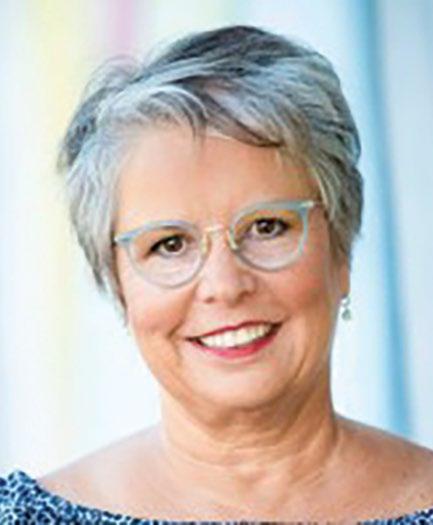
Bullying and incivility contribute to unhealthy workplace cultures. Current research indicates when bullying and incivility are ignored by leaders there is a direct negative correlation to burnout, turnover, medical errors, and patient outcomes. As organizational leaders are focused on recruitment efforts to mitigate the current staffing crisis they are overlooking a key ingredient to keeping the nurses they do hire. The key ingredientleaders need to stop tolerating disruptive behaviors and start holding nurses accountable for professional conduct if they want to keep their experienced and new nurses.
The Healthy Workforce Institute research has seen a surge in disruptive behaviors over the past two years. Studies support the increase of disruptive behaviors in the workplace:
• Less than 50% of nurses state their organization values their health and safety with over 216,000 incidents of incivility occurring in the past year. (AACN, 2022)
• Only 42% of nurses state their workplace is healthy and/or positive. (ANF, 2022)
• Individuals who experience high levels of toxic behavior at work are eight times more likely to experience burnout symptoms and are six times more likely to leave within the next 3 – 6 months. (McKinsey, 2022)
• Disruptive behaviors in the workplace have a detrimental effect on employee morale and turnover with high rates of medical errors and adverse patient outcomes (The Joint Commission, 2021).
Leaders are struggling to help their teams with the overwhelming stressors and excessive workloads, leading to greater burnout and substantial turnover. Leaders have shared they don’t know what to say, how to say it, or what to document when disruptive behaviors occur within the workplace, especially during a critical staffing crisis. Organizations must equip leaders with the knowledge and skill on how to address bullying and incivility so that they can create healthy work cultures where nurses want to stay and where patients receive better outcomes.
Evidence-based, practical strategies are needed by leaders to transform the workplace culture. The foundational principles required by leaders to reduce the incidents of bullying and incivility include:
• The knowledge to differentiate between bullying and incivility.
• The ability to recognize how disruptive behaviors show up in their department.
• The ability to collaboratively establish department behavioral expectations.
• The confidence to address individuals with disruptive behaviors.
• The confidence to hold team members accountable for their actions.
Courage is more exhilarating than fear and in the long run it is easier. ~ Eleanor Roosevelt
Eleanor was a bold leader for her time, she led by showing others their inner potential and what they can do in the world if they have the confidence. When leaders are equipped with the skills, strategies, and foundational principles to address and eliminate workplace bullying and incivility they too will have the confidence, like Eleanor, to transform the workplace culture. They will have the knowledge, skills, and confidence to reduce the incidents of bullying and incivility which will positively impact the
effects on burnout, turnover, medical errors, and patient outcomes. It is time for organizations to implement a culture change strategy to hardwire and sustain healthy work environments by equipping leaders with the foundational principles to eradicate bullying and incivility cultivating healthy, professional work environments.
References
American Nurses Foundation. (2022). Pulse on the nation’s nurses survey series: 2022 Workplace survey. https://prd. healthynursehealthynation.org/~4a209f/globalassets/ covid19/anf-2022-workforce-written-report-final.pdf
Brassey, J., Coe, E., Dewhurst, M., Enomoto, K., Giarola, R., Herbig, B. & Jeffery, B. (2022, May). Addressing employee burnout: Are you solving the right problem? McKinsey Health Institute https://www.mckinsey.com/mhi/our-insights/addressingemployee-burnout-are-you-solving-the-right-problem
The Joint Commission. (2021, June). Quick Safety 24: Bullying has no place in health care. https://www.jointcommission.org/ resources/news-and-multimedia/newsletters/newsletters/ quick-safety/quick-safety-issue-24-bullying-has-no-placein-health-care/bullying-has-no-place-in-health-care/#. YxtFBS2B1ZE
Ulrich, B., Cassidy, L., Barden, C., Varn-Davis, N., & Delgado, S. (2022, August 1). National nurse work environments –October 2021: A status report. Critical-Care Nurse, e1-e18. doi.org/10.4037/ccn2022798
Bio:
Cheryl Mallory, MSN, RN-NPD
Director of Education & Research
The Healthy Workforce Institute
Cheryl brings over 20 years of healthcare experience as a workforce development specialist with her Master’s in Nursing and Nursing Professional Development certification. She began her nursing practice as a pediatric perioperative nurse and has a passion for elevating the care environment promoting high quality, safe patient care.
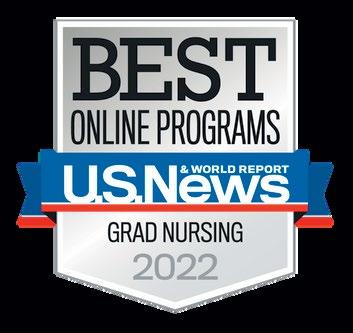


Violent assaults against nurses and other health care workers are escalating and accounted for 12.2% of all injuries to registered nurses in 2016 (U.S. Bureau of Labor Statistics [BLS], 2016). The violent and unwanted attacks from a patient or person connected to the patient has led to head injuries, fractures, bruises, sprains, and even death during patient care (Jones, 2021a; Crawford et al., 2019). The U.S. Bureau of Labor Statistics [BLS] (2019), reported that workplace violence is increasing over time with a rise in violent incidents from 6.4 per 10,000 in 2011 to 10.4 per 10,000 in 2018 and accounted for 73% of all nonfatal workforce violence-related injuries or illnesses. This article will report current efforts to address and to eliminate workplace violence through federal legislation, governmental mandates, nursing advocacy, workplace initiatives, and employee training.
Federal Legislation
In 2020, the U.S. House of Representative bill number 1309 (HR 1309), Workplace Violence Prevention for Health Care and Social Service Workers Act, was introduced by Representative Joe Courtney on February 19, 2019, in the 116th Congress. HR 1309 would require the U.S. Department of Labor to address issues of workplace violence in health care agencies and social service areas. HR 1309 died in Congress in 2020 and was not enacted (Congress.gov, 2019-2020). However, in 2021 the U.S. House of Representatives passed bill number 1195 (H.R. 1195), by a vote of 254 to 161, the “Workplace Violence Prevention for Health Care and Social Workers Act.” H.R. 1195 requires the Department of Labor to address this growing threat of workplace violence in health care, social service agencies, and other sectors of our communities that intersect with the public (Congress.gov, 2021-2022).
Governmental Mandates
U.S. Department of Labor was directed to address issues of workplace violence in health care agencies and social service areas based upon the Occupational Safety and Health Administration (OSHA) 2015 published guidelines (Congress.gov, 2019-2020). OSHA was then mandated to create enforceable safety standards by 2025 (Congressional Budget Office [CBO], 2021; Occupational Safety and Health Administration [OSHA], 2021). In response to H.R. 1195 Workplace Violence Prevention for Health Care and Social Workers Act, OSHA developed enforceable safety standards that include: (1) clear guidelines to prevent violence in the workplace, (2) developing and implementing plans to protect and prevent workplace violence by conducting appropriate workplace activities, (3) require compliance of the new standards as a condition of agencies’ Medicare provider agreement, and (4) mandate intergovernmental and private sector facilities to comply with the new OSHA standards.
Nursing Advocacy
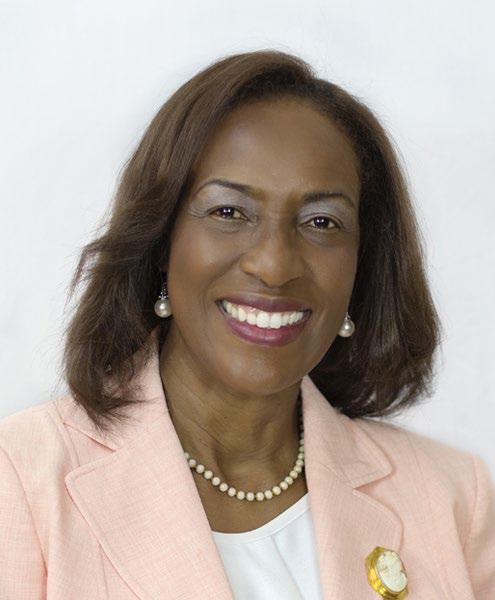
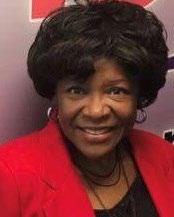

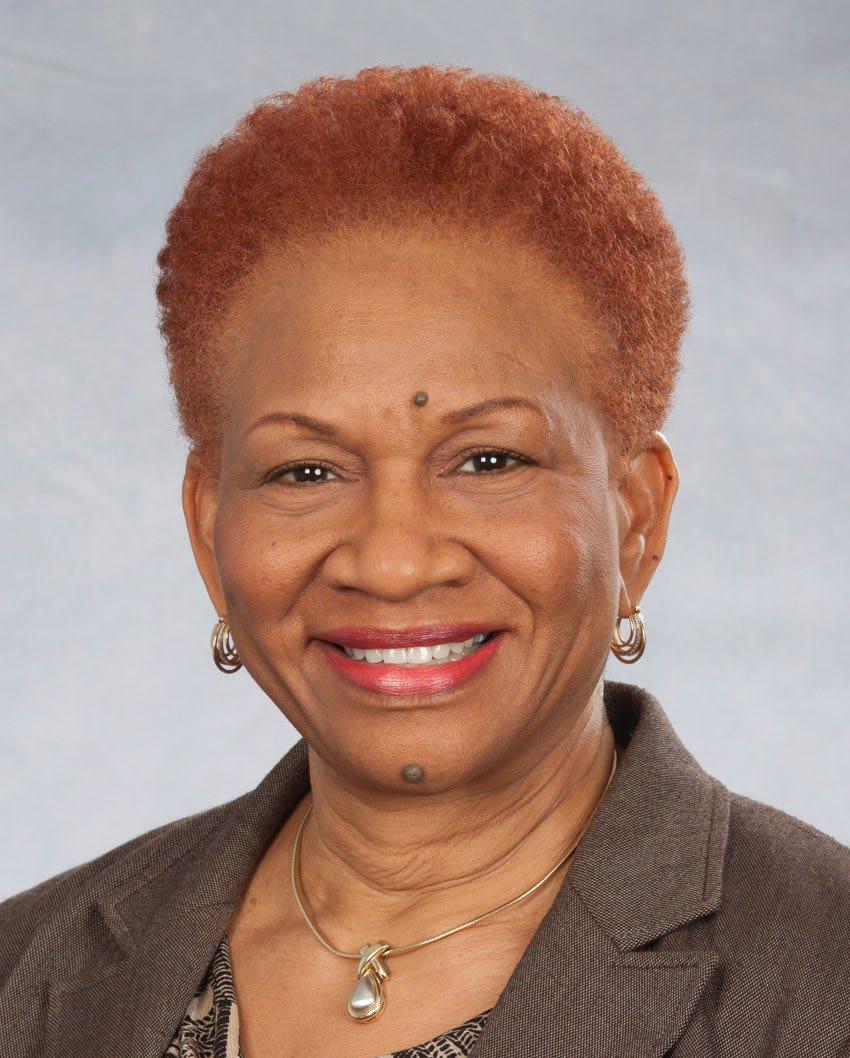
Customer-on-worker workplace violence (WPV) is referred to as a Type II workplace violent act against nurses (Byon et al. 2021). Type II WPV has uncovered the ongoing safety and health challenges faced by nursing, along with increased underreporting. Byon et al (2021) reported that during COVID-19 nurses experienced “more physical violence and verbal abuse” than those nurses who were not assigned to care for COVID-19 patients. This finding and a recent Dallas, TX shooting occurring at
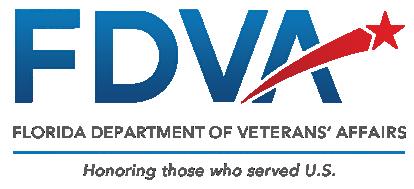

Methodist Dallas Medical Center killing two nurses, underscore the urgent need for drastic improved prevention for WPV (New York Post, 2022). Another 2022 incident reported during a Harvard Law School’s Petrie-Flom Center for Health Law Policy, Biotechnology, and Bioethics 4-member panel involved the story of Elise Wilson, emergency care trained nurse who was stabbed and punched by a patient while on duty at Harrington Hospital in Southbridge, Massachusetts (CBS 2022).
There are several nursing organizations that support H.R. 1195 to foster preventing violence against healthcare workers in the workplace. The Florida Nurses Association (FNA) supports legislation that provides meaningful information on nurse staffing issues and available resources to healthcare users. FNA also promotes legislation that protects healthcare workers against workplace violence, including rigorous prosecution to persons who commit those crimes (FNA, 2022), along with other nursing organizations listed in this article. The American Nurses Association (ANA), American Organization for Nursing Leadership (AONL), American Association of Critical Care Nurses (AACN), and the Emergency Nurses Association (ENA) are a representative sample of the many nursing organizations that support efforts to reduce WPV. The ANA web page provides a more comprehensive list of those organizations supporting the workplace violence initiative. ANA also provides a resource guide through their #EndNurseAbuse initiative to encourage nurses to participate, report, and advocate for nurses. Additional information on continued actions to address the issue of workplace violence can be found on the ANA Workplace Violence webpage.
The AONL and ENA recently updated and released their “Workplace Violence Toolkit directed towards efforts to protect hospital employees and workers-initiated ground workplace violence prevention programs, increasing institutional support, promoting a culture of safety, while developing interprofessional teams to include leadership, staff, patients, and visitors, and emphasizing accountability. More information can be found at the AONL and ENA websites (American Organization of Nursing Leadership [AONL], 2022; Emergency Nurses Association, [ENA], 2022]. AACN supported the passage of HR 1195 (AACN, 2021). Cunningham-Regis (2021), in her doctoral paper strongly advocated for federal legislation to provide standardized approaches to address workplace violence against working nurses.

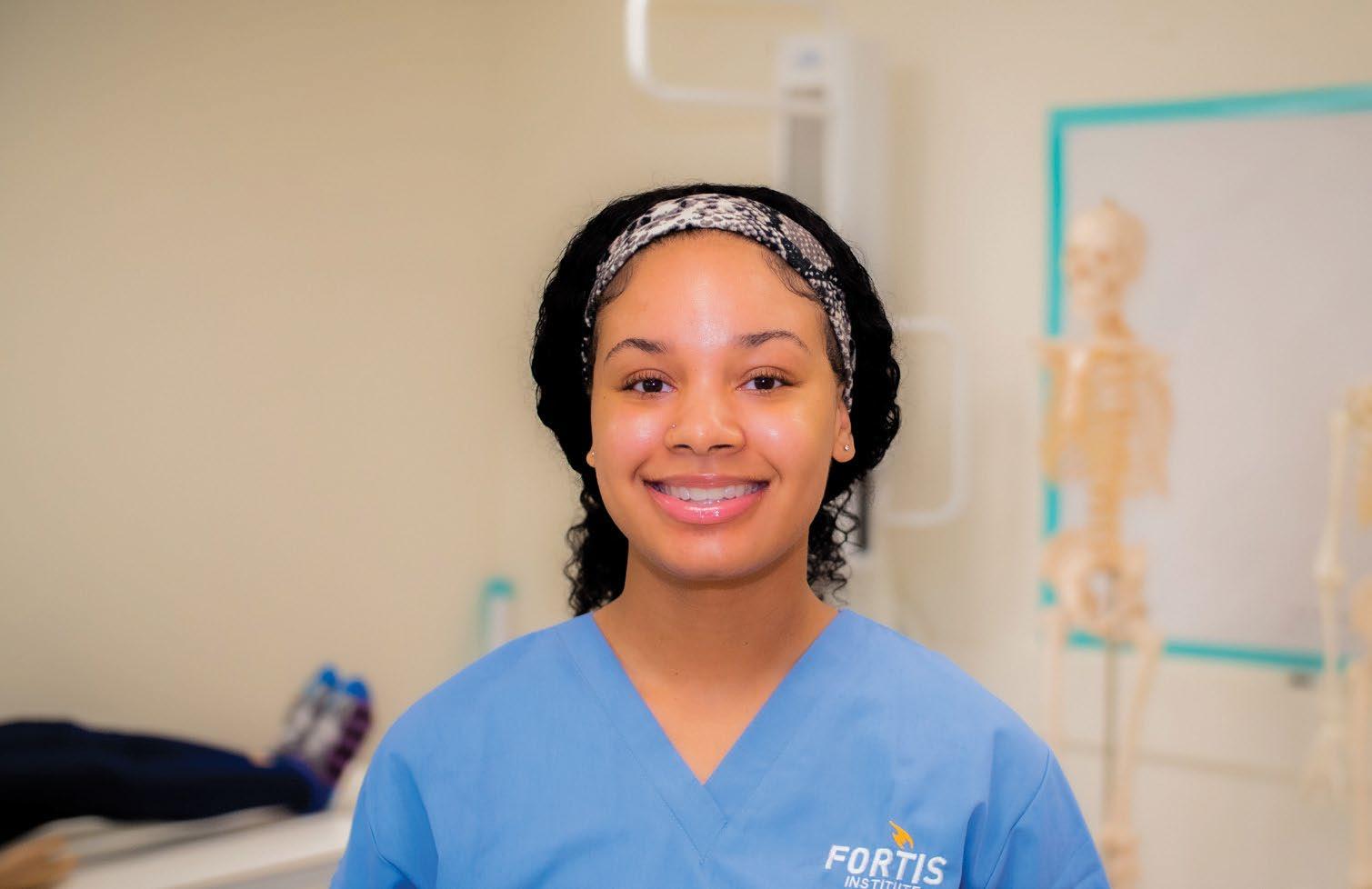
The American Hospital Association (AHA) stood in opposition to H.R. 1195, insisting that the public was denied an opportunity to review the new standards; that hospitals and health systems have fully implemented policies and programs to address workplace violence; and that the current health systems were committed to a “culture of safety for every worker, patient, and family member” (American Hospital Association [AHA], 2021). Nonetheless, OSHA’s mandate requires that employers must comply with the standards and regulations established for safety and health in the workplace. Pursuant to the OSH Act, the safety and health standards are enforced by OSHA or an OSHA-approved state plan. Pursuant to the OSH Act, employers must comply with safety and health standards and regulations issued and enforced either by OSHA or by an OSHA-approved state plan (OSHA, 2021).
Nurses are aware that there is an increase in threats, intimidation, and actual violence to health care workers. Reports show that workplace violence is seen more among nurses and healthcare workers in hospitals, than in outpatient clinics or physician offices (BLS, 2019). According to Mento et al. (2020), violence against nurses occurs more frequently in emergency care centers, mental health facilities, specifically psychiatric units, patient waiting areas, and on geriatric care units. One major barrier to addressing workplace violence is a lack of reporting (Jones, 2021b). There are three primary reasons for not reporting the violent encounters: (1) Nurses fear retaliation; (2) The reporting methods are unclear; and (3) Nurses affected by workplace violence feel that nothing will be done about the incident. Another reason for underreporting comes from the perception that the perspective threat was neutralized, and the situation was controlled or contained (Hester, Harrelson, & Mongo, 2016; Potera, 2016).
Additionally, the Joint Commission reported that healthcare workers were more likely to experience workplace violence than workers in other industries and issued a Sentinel Event Alert to assist health care workers in recognizing, preventing, and managing verbal and physical violence from their patients or guest (Stockwell, 2018). In 2022, the Joint Commission introduced its new initiative on workplace violence prevention requirements that addresses policies and procedures, definition of workplace violence, workplace violence prevention programs , leadership oversight, data collection, training and education, and post-incidence strategies (The Joint Commission, 2022) . There are several nursing articles that address the issue of workplace violence against nurses and strategies to address the issue (Jones, 2021a,b; Potera, 2016; Hester, Harrelson, & Mongo, 2016; Worthington & Franklin, 2001).
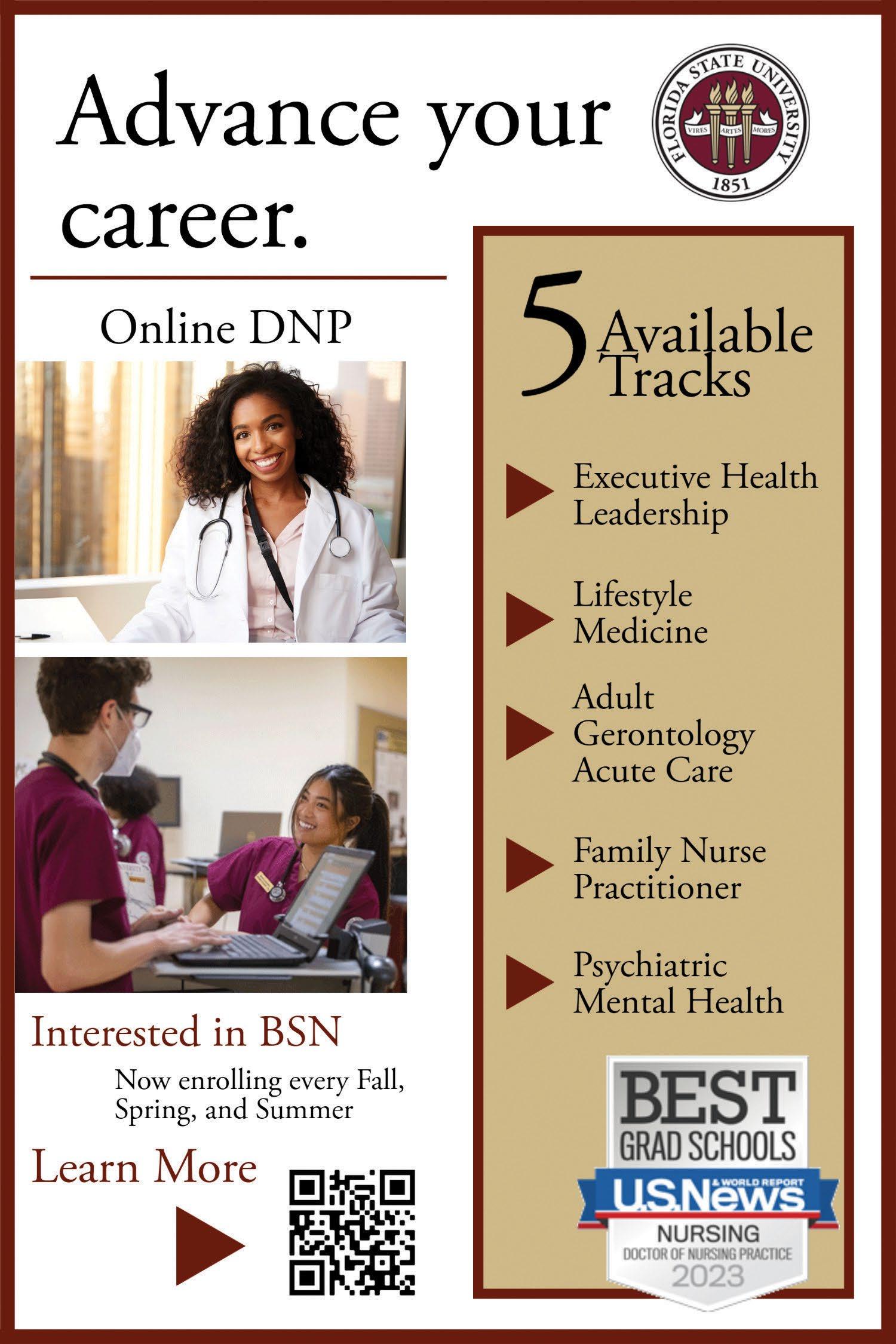
Workplace violence in healthcare is most often committed by patients and their family members in the form of psychological violence, verbal abuse, sexual abuse, and physical abuse (Mento et al., 2020). The occurrence of workplace violence can have numerous negative ramifications on healthcare providers, including increased anxiety and stress levels, feelings of guilt, anger, insecurity, and increased burnout (Mento et al., 2020). Workplace violence against nursing professionals is an unacknowledged crisis. The repercussions of workplace violence are harmful to the nursing profession, as well as the healthcare industry. Unfortunately, there has been a dearth of protective mechanisms and standardized prevention plans. Only through mandated legislation will sustainable change be achieved for nurses. The United States House of Representatives bill number 1309, under Workplace Violence Prevention for Health Care and Social Service Workers Act was developed to provide a concise prevention plan to healthcare facilities across the nation. Although the bill died in Congress, there is continued advocacy efforts from nursing organizations across the country.
One instrument that is in use is the Broset Violence Checklist. The Brøset Violence Checklist (BVC) is a short-term risk assessment tool that can be used to provide a predictive aggression score within a 24-hour perspective (Woods & Almvik, 2002). The BVC assesses boisterousness, confusion, irritability, physical threats, and attacks on objects as either present or absent, and verbal threats. The BVC has proven its value scientifically and practically. The BVC is in use in more than 40 countries and in a variety of settings in health care and beyond to improve workplace safety and to save costs (Woods & Almvik, 2002).
Healthcare agencies have a legal and moral responsibility to protect nurses and other health care workers. Legal implications affect the agency, agency administrators, hospital staff, and patients. Legal jeopardy occurs when there is negligence in security applications, negligent supervision, negligent retention of known violent workers, failure to warn, lack of emergency treatment orders, lack of de-escalation training to employees, and controlling access points, such as secure perimeters and providing protective barriers (self-locking doors, visitor identification, and other such measures).
Although all states do not have laws governing workplace violence, Florida does. This started in 2017 with House Bill 1207 which gave protection by providing enhanced penalties for persons who attack first responders. This protection was expanded to all healthcare workers resulting in Florida Statute 784.07 which describes who is protected from workplace violence under the laws of this state. In fact, there are three states with laws governing this behavior. They are Florida, Virginia, and Washington. Florida Statute 784.07(1) (a) identifies emergency medical care providers to include ambulance drivers,
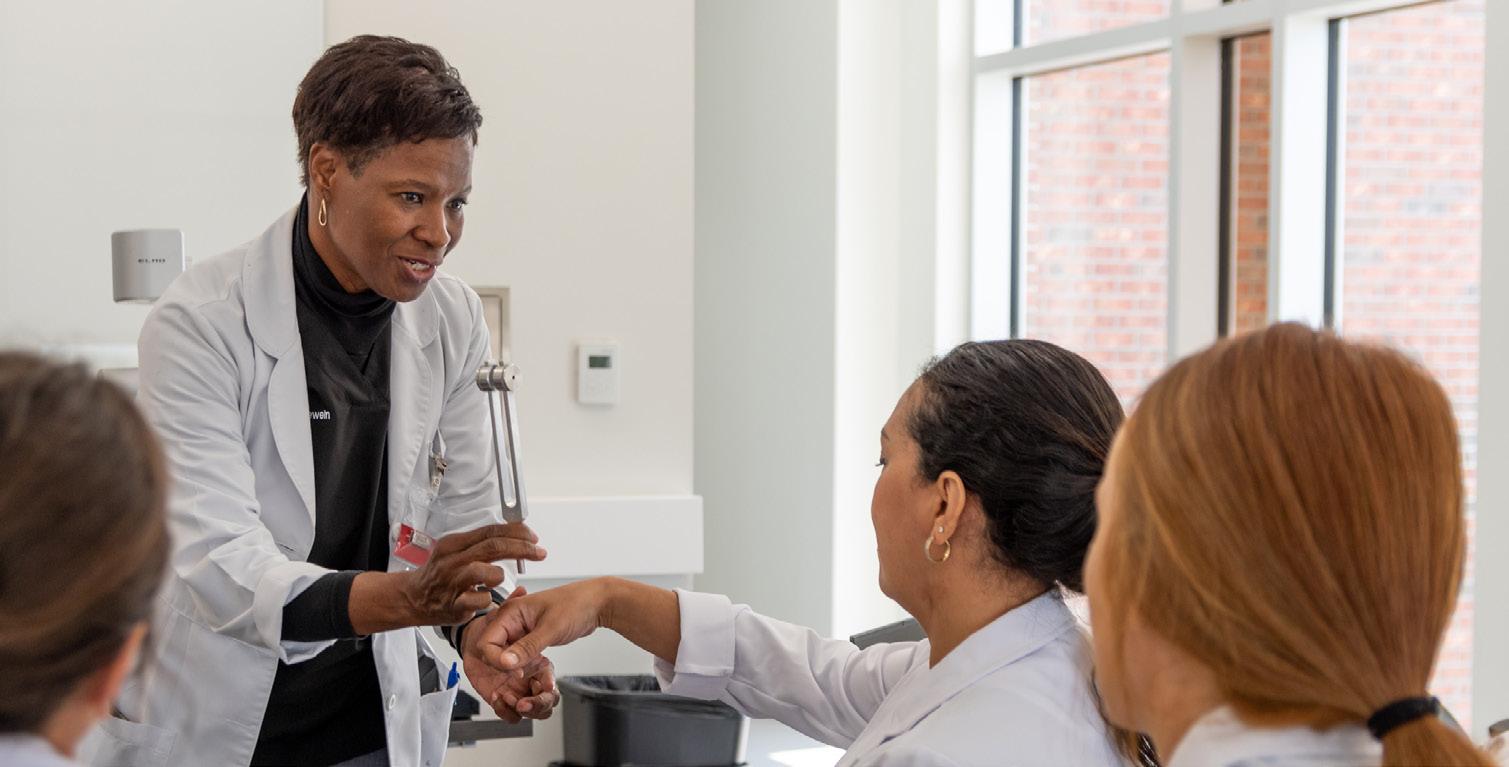
emergency medical technicians, paramedics, and doctors. The registered nurse is also included in this section of the statute. Thus, the Florida nurse has a legal right to a safe working environment.
Conclusion
Workplace violence against nurses and other healthcare personnel must be addressed through nursing advocacy supported by national, regional, state, and local nursing organizations, and legislation as seen in OSHA regulations and federal mandates. Nurses are encouraged to report any incidence of workplace violence immediately. Healthcare administrators are advised to act and to support nurses when reports of workplace violence is received. The issue of workplace violence can no longer be hidden or suffocated under bureaucracy. There are assessment tools available to evaluate aggression in the workplace and healthcare administrators are encouraged to explore its uses. Healthcare agencies have a legal and moral obligation to protect nurses, healthcare workers, and patients from violence in the workplace by reviewing and implementing security, training, and barriers, as well as removing known violent workers from employment rosters that may harm patients or other healthcare workers.
References
American Association of Critical Care Nurses (AACN (2022). Legislation to Address Workplace Violence. https://www.aacn.org/
American Hospital Association (2021). House Passes the Workplace Violence Prevention Bill. https://www. aha.org/news/headline/2021-04-16-house-passesworkplace-violence-prevention-bill
American Nurses Association (ANA) (n.d.) Workplace Violence in Nursing: Dangerous & Underreported https://www.nursingworld.org/practice-policy/ work-environment/end-nurse-abuse/workplaceviolence/
American Organization of Nurse Leaders (AONL) (2022). AONL, ENA Release Workplace Violence Toolkit. https://www.aonl.org/news/AONL-ENA-ReleaseWorkplace-Violence-Toolkit
Byon HD, Sagherian K, Kim Y, Lipscomb J, Crandall M, Steege L. (2021). Nurses’ Experience With Type II Workplace Violence and Underreporting During the COVID-19 Pandemic. Workplace Health Safe. 2021 Aug 3:21650799211031233. doi:10.1177/21650799211031233. Epub ahead of print. PMID: 34344236.
CBS News (2022). Nurse brutally stabbed on the job pleads for hospital security law. https://www. cbsnews.com/news/nurse-stabbed-by-patienthospital-security-law-elises-law/ Congressional Budget Office (April 2021). H.R. 1195, Workplace Violence Prevention for Health Care and Social Service Workers Act. https://www.cbo.gov/ publication/57135
Crawford, C., Chu, F., Judson, L., Cuenca, E., Jadalla, A., Tze-Polo, L., Kawar, L., Runnels, C., Garvida, R. (2019). An Integrative Review of Nurseto-Nurse Incivility, Hostility, and Workplace Violence: A GPS for Nurse Leaders. Nursing Administration Quarterly: April/June 2019Volume 43 - Issue 2 - p 138-156 doi: 10.1097/ NAQ.0000000000000338
Cunningham-Regis, E. (2021). Preventing healthcare workplace violence through legislation. https://sigma.nursingrespository.org/ handle/10755/21990
Emergency Nurses Association (ENA) (2022). Action Center. https://www.votervoice.net/ENA/ Campaigns/95665/Respond
Florida Nurses Association (FNA) (2022). Florida Nurses Association 2021/2022 Legislative and Regulatory Policy Platform. https://cdn.ymaws.com/www. floridanurse.org/resource/resmgr/legislative/2022_ FNA_Legislative_Platfor.pdf
Hester, S., Harrelson, C., & Mongo, T. (2016). Workplace violence against nurses: Making it safe to care. Creative Nursing, 22(3), 204-209.
H.R.1309 - 116th Congress (2019-2020): Workplace Violence Prevention for Health Care and Social Service Workers Act. (2019, November 21). https://www.congress.gov/bill/116th-congress/ house-bill/1309
H.R.1195 - 117th Congress (2021-2022): Workplace Violence Prevention for Health Care and Social Service Workers Act. (2021, April 19). https:// www.congress.gov/bill/117th-congress/housebill/1195
Jones, M. (2021a). Preventing workplace violence in healthcare. American Association of Critical Care Nursing, https://www.aacn.org/blog/preventingworkplace-violence-in-healthcare
Jones, M. (2021b). Workplace Violence Prevention: Between Patients and Staff Utilizing the Broset Violence Checklist in an Adult Medical Surgical Telemetry Unit (Doctoral dissertation, University of California, Davis).
Mento, C., Silvestri, M.C., Bruno, A., Muscatello, M.R.A., Cedro, C., Pandolfo, G., & Zoccali, R.A. (2020). Workplace violence against healthcare professionals: A systematic review. Aggression and Violent Behavior, 51(101381. https://doiorg.ju.idm. oclc.org/10.1016/j.avb.2020.101381
New York Post (22 October 2022). 2 nurses fatally shot at Methodist Dallas Medical Center: parolee in custody. Nypost.com
Occupational Safety and Health Administration [OSHA] (2021). Guidelines for Preventing Workplace Violence for Healthcare and Social Service Workers. https://www.osha.gov › publication
Potera, C. (2016). Violence against nurses in the workplace. AJN The American Journal of Nursing, 116 (6), 20-21.
Stockwell, S. (2018). Joint Commission Issues Alert Addressing Violence Against Health Care Workers. AJN, American Journal of Nursing: July 2018Volume 118 - Issue 7 - p 14
The Joint Commission (2022). R3 Report Issue 30: Workplace Violence Prevention Standards. https:// www.jointcommission.org/standards/r3-report/r3report-issue-30-workplace-violence-preventionstandards/#.Y2kvfXbMJD8
U.S. Bureau of Labor Statistics (2016). Injuries, Illnesses, and Fatalities. https://www.bls.gov/iif/home.htm
U.S. Bureau of Labor Statistics (2019). Injuries, Illnesses, and Fatalities. https://www.bls.gov/iif/home.htm
Woods P, Almvik R. The Brøset violence checklist (BVC). Acta Psychiatr Scand Suppl. 2002;(412):103-5. doi: 10.1034/j.1600-0447.106.s412.22.x. PMID: 12072138
Worthington, K. & Franklin, P. (2001). Workplace Violence: What to do if you’re assaulted. American Journal of Nursing: April 2001 - Volume 101Issue 4 - p 73
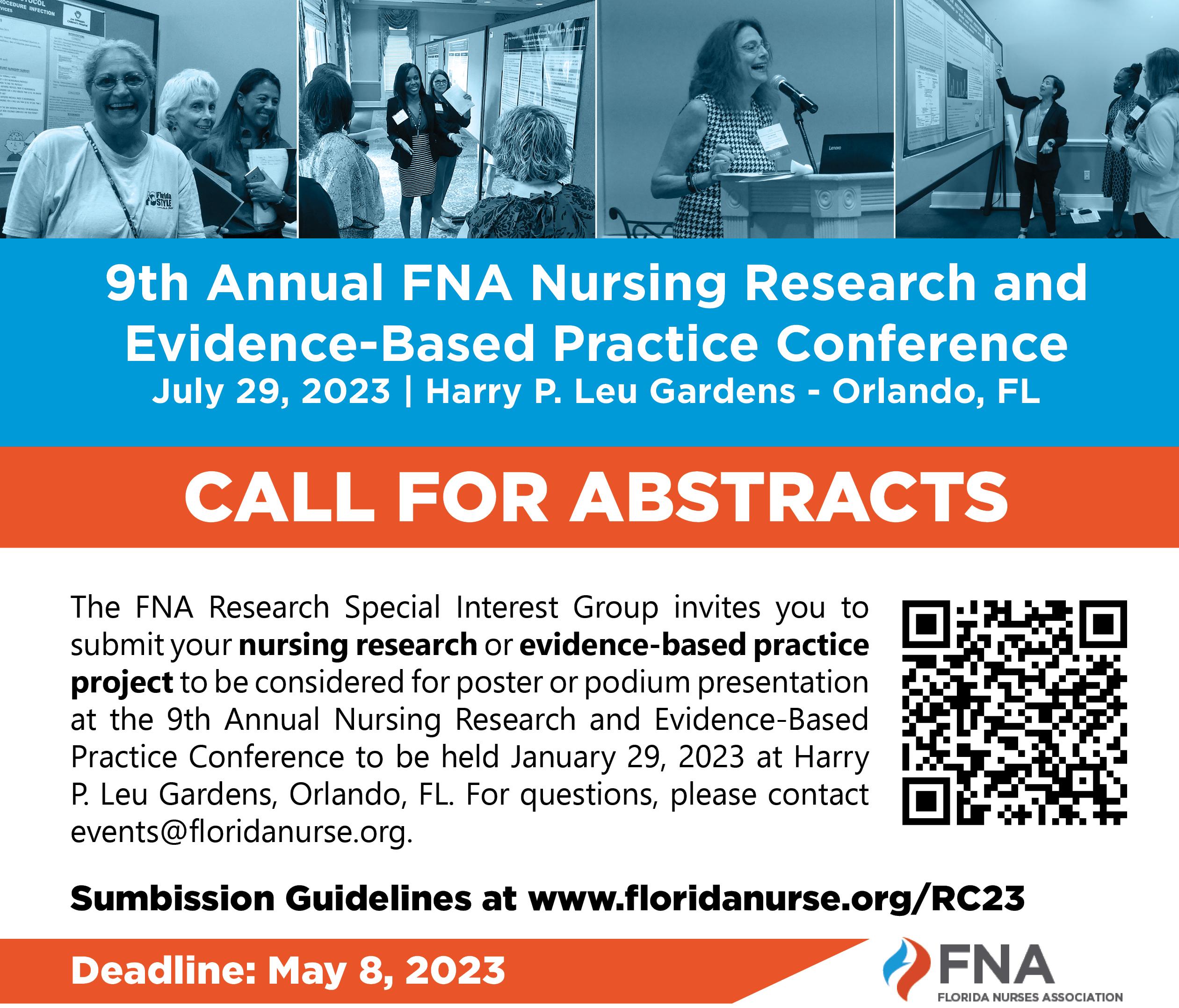

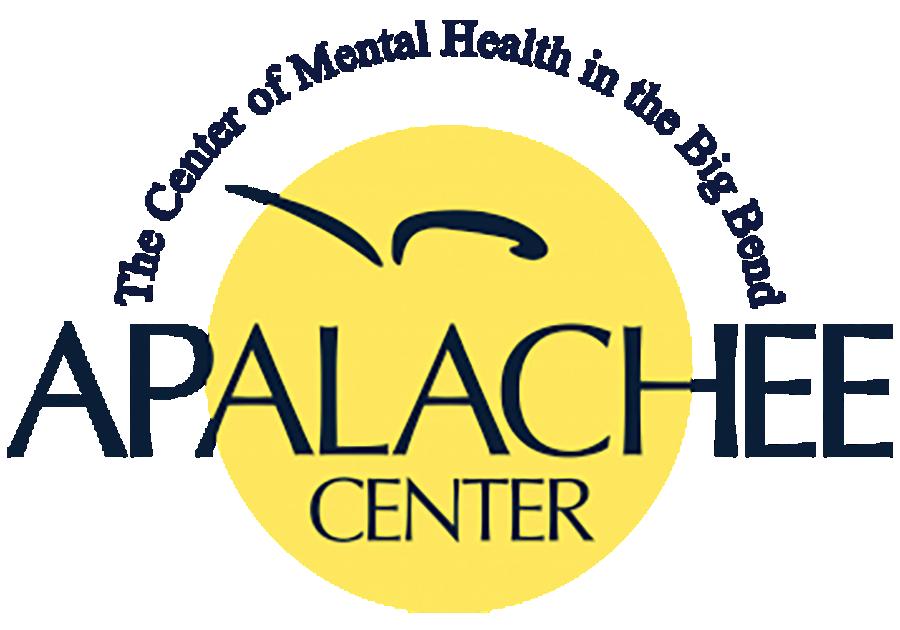
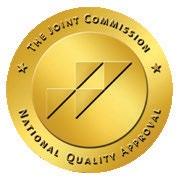

By 2030 it has been estimated that the number of nurses needed in the United States will be over 3 million, thus resulting in a supply and demand imbalance (Burger, 2022). Nurses are not alone in these predicted shortages. A similar landscape has been painted for other members of the healthcare team. This includes, but is not limited to, home-health aids, nursing assistants, and medical lab technicians (Eddy, 2021). Healthcare preapprenticeship programs have the potential to confront this complex healthcare workforce issue by preparing the pre-apprentice to take on the challenges of caregiving in a variety of workplace settings and positively impacting both their career and the people in their care. In fact, pre-apprenticeship programs have resulted in better wages and opportunities for pre-apprentices, while also meeting the employer’s need for trained workers (Monthey, 2019).
client-centered care, and (5) healthcare basics. The program reviews various career paths in healthcare including home health aide, pharmacy technician, surgical technician, medical assistant, certified nursing assistant, community health worker, and patient care technician. The TruMont team including Faculty Coaches are available to the pre-apprentice throughout the entirety of the program and collaborate with them to ensure steady progress and successful program completion.

A debriefing survey is given to each preapprentice upon completion of the program. Questions gather information on career path development, knowledge of healthcare delivery, and confidence. To date, 40 pre-apprentices have completed the Healthcare Pre-Apprenticeship Program and debriefing survey. Initial results show promise in improving pre-apprentices’ belief in their abilities, knowledge, and professional future. The majority agree that the materials provided were effective in conveying important information. 85% (n=34) of pre-apprentices indicated that the Healthcare Pre-Apprenticeship Program will help them feel more confident in pursuing a career in healthcare and 80% (n=32) indicated that the Healthcare Pre-Apprenticeship program will help them choose a career in healthcare.
the healthcare field. Doing so may not only assist in meeting the demanding healthcare workforce needs, but also in diversifying the caregiver population. This is especially important given that a diverse, competent healthcare workforce is key to providing adequate care and improving health outcomes for patients (Butkus et al., 2020).
References
Burger, Catherine. (2022, August 5). The states with the largest nursing shortages. Registered Nursing.org. Retrieved October 6, 2022, from https://www. registerednursing.org/articles/largest-nursingshortages/
Butkus, R., Rapp, K., Cooney, T. G., & Engel, L. S. (2020). Envisioning a better U.S. health care system for all: Reducing barriers to care and addressing social determinants of health. Annals of Internal Medicine, 172(2). https://doi.org/10.7326/m192410
Eddy, N. (2021, October 7). Staffing shortages ramp up recruitment pressure on hospitals. Healthcare Finance News. Retrieved October 6, 2022, from https://www.healthcarefinancenews.com/news/ staffing-shortages-ramp-recruitmentpressurehospitals
In early 2022, the TruMont team deployed and began enrollment into the TruMont Healthcare PreApprenticeship Program. This is a 6-month program and includes modules that focus on the following topics: (1) healthcare career exploration, (2) math in healthcare, (3) communication & terminology, (4)
These findings are preliminary as the TruMont Healthcare Pre-apprenticeship Program is relatively new and ongoing. However, such findings highlight the potential impact that the TruMont Healthcare Pre-Apprenticeship program can have on increasing the capacity of the healthcare workforce. This, and similar programs, should be utilized as a tool to curate a pipeline of qualified candidates for healthcare careers. Furthermore, expanding these opportunities to those with little or no healthcare experience assists with tapping into populations that may have previously not thought about a career in
Monthey, W. (2019). The Critical Role of Apprenticeship Programs. State Education Standard, 19(3), 30–46. https://doi.org/https://files.eric.ed.gov/fulltext/ EJ1229470.pdf
Author Biographies
Valerie Halstead, PhD, APRN, FNP-BC – Valerie earned a Doctorate of Philosophy in Nursing, Master of Science in Nursing and a Bachelor of Science in Nursing from the University of Miami. She is dedicated to the advancement of the Nursing profession, which is reflected in her work in educational, clinical, and research arenas.
Abigail Carden, MPH, CPH – Abigail earned a Master of Public Health and a Bachelor of Science in Biology from the University of Florida. She is currently working in data analysis and informatics where she is practicing her passion for healthcare research.

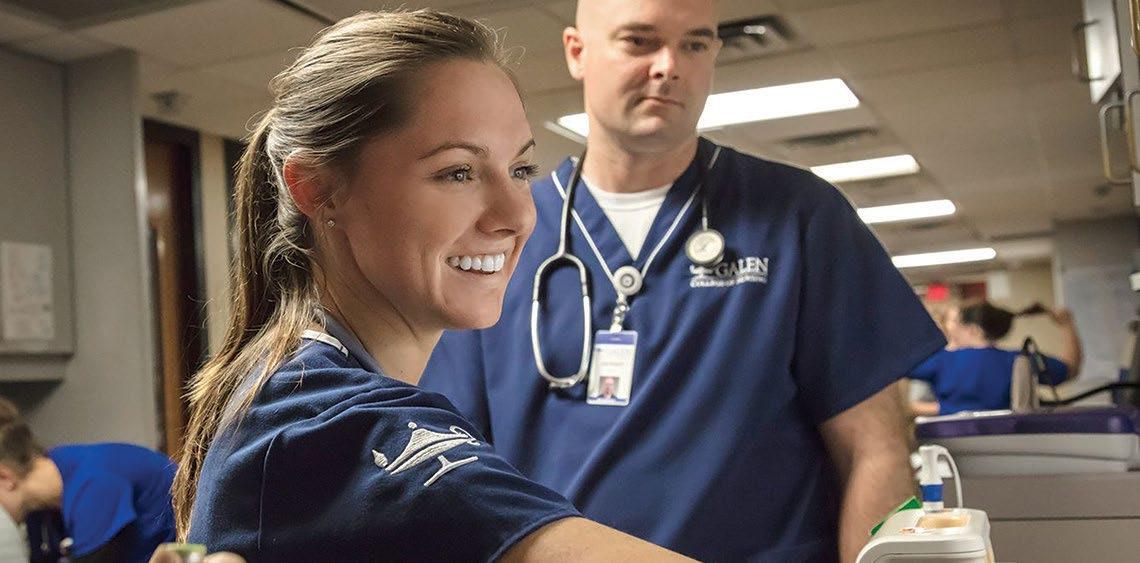

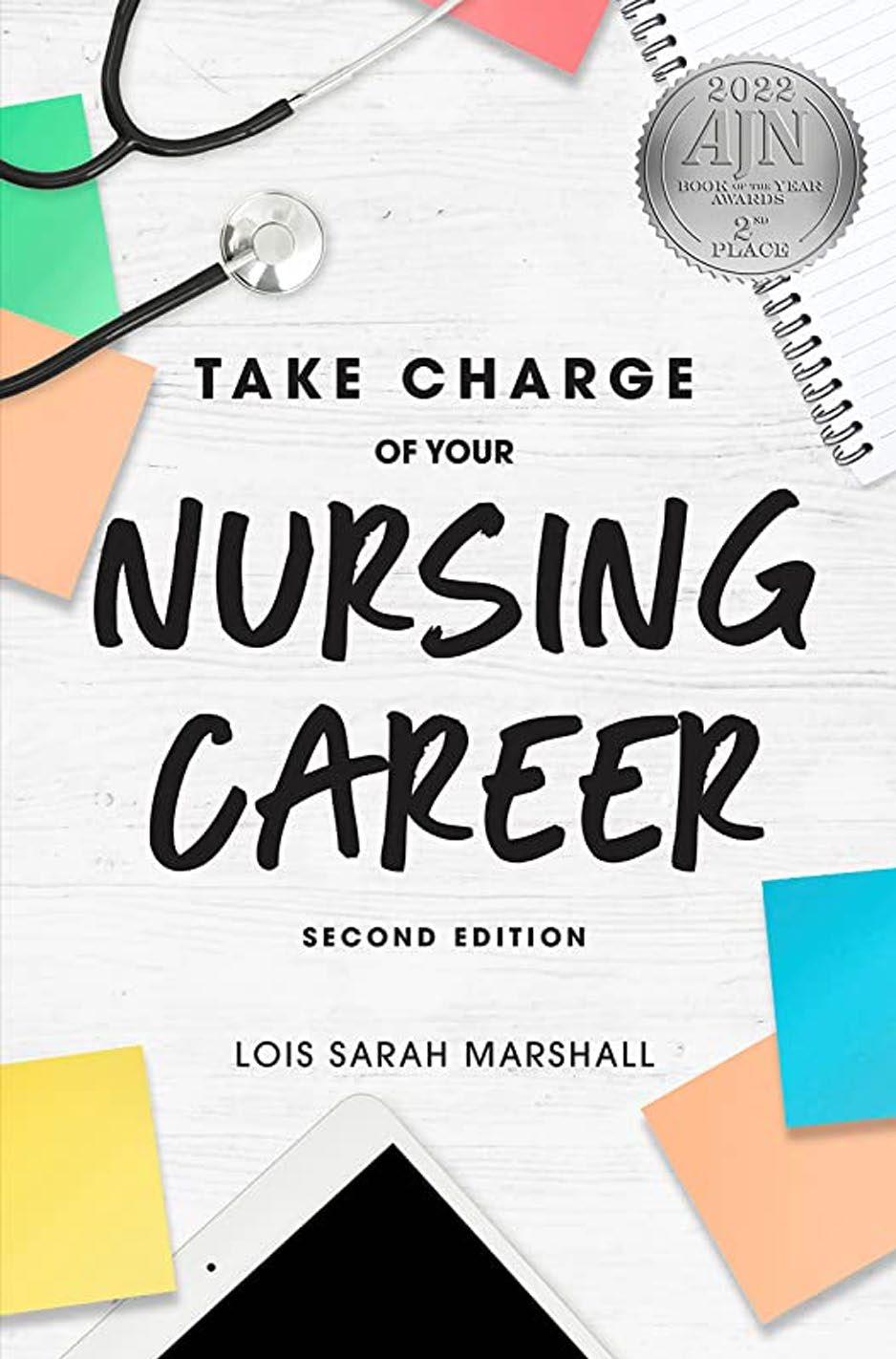
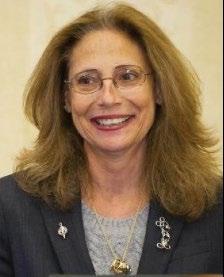
Longtime FNA Member
Lois Sarah Marshall, PhD, MN, RN, recently received a Book of the Year Award for 2022 by the American Journal of Nursing for her book entitled Take Charge of Your Nursing Career, Second Edition. In recent years, the topic of career development and management has become a career-long process rather than something only new graduates Consider. Dr. Marshall recognizes that the notion of career is a fluid process and helps nurses at all stages in their career journey in her updated book.
This book’s 11 chapters contain topics that will help nurses grow, maintain, sustain, and advocate for their careers. The second edition of Take Charge of Your Nursing Career includes updated chapters from the first edition about resumés, curriculum vitae, portfolios, educational advancement, professional development, and entrepreneurship. In addition to these updated chapters, new and timely topics are also included, such as mentorship, developing a nursing identity, the impact of social media, work-life balance, and more. This conversational, user-focused book also includes reflections from experienced nurses who want to help other nurses throughout their career journeys.
“One of the great things about being a nurse is that you can constantly re-examine your career trajectory and expand and grow in directions you hadn’t even dreamed of when you graduated from nursing school,” said Lois Marshall. “Particularly as our world regains its balance in the aftermath of the COVID-19 pandemic, be open to a new and different future. When you are ready to move forward—or even sideways—I hope you will allow this book to assist you in examining all the possibilities open to you as a professional nurse and determining how to make them happen for you.”
